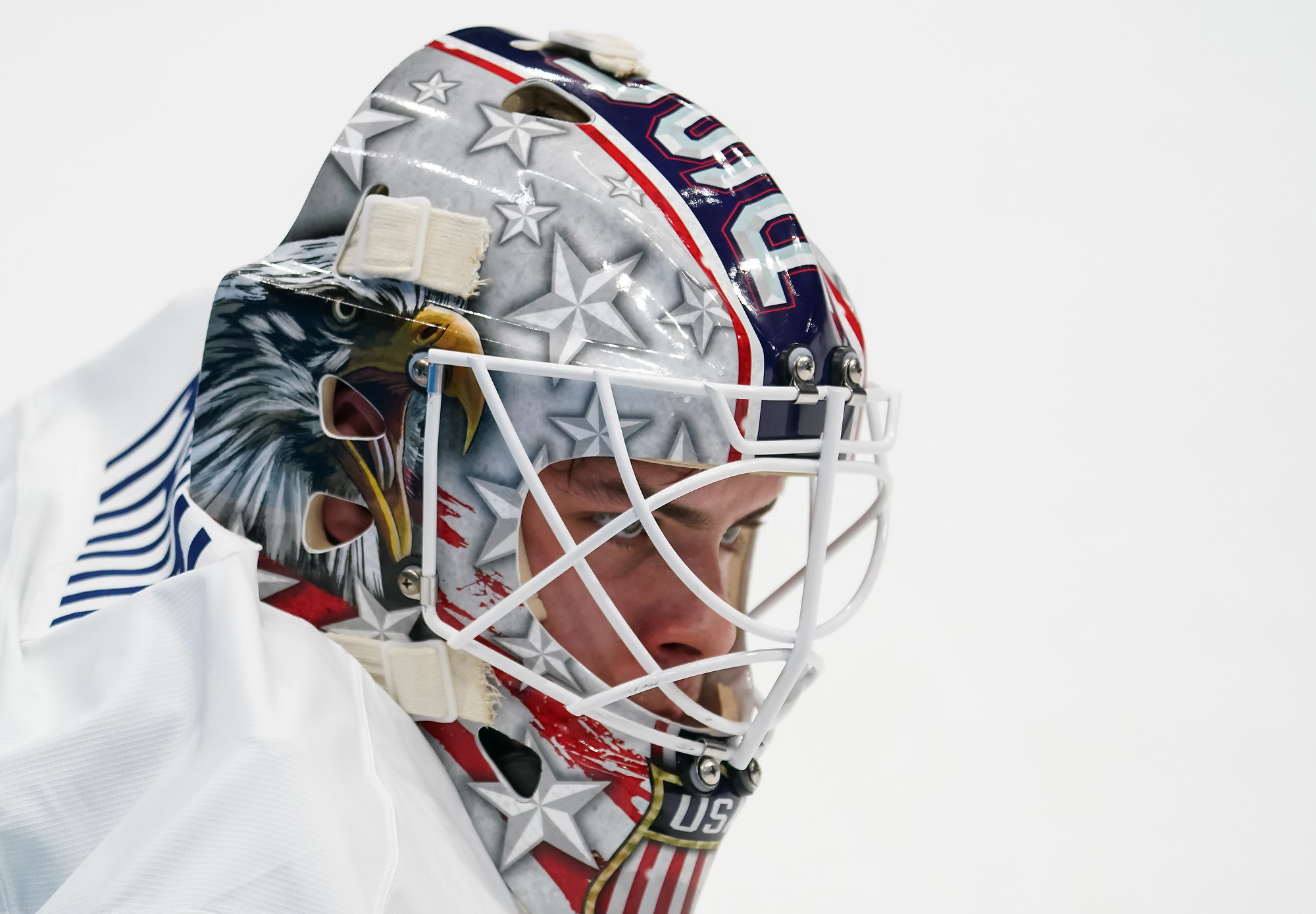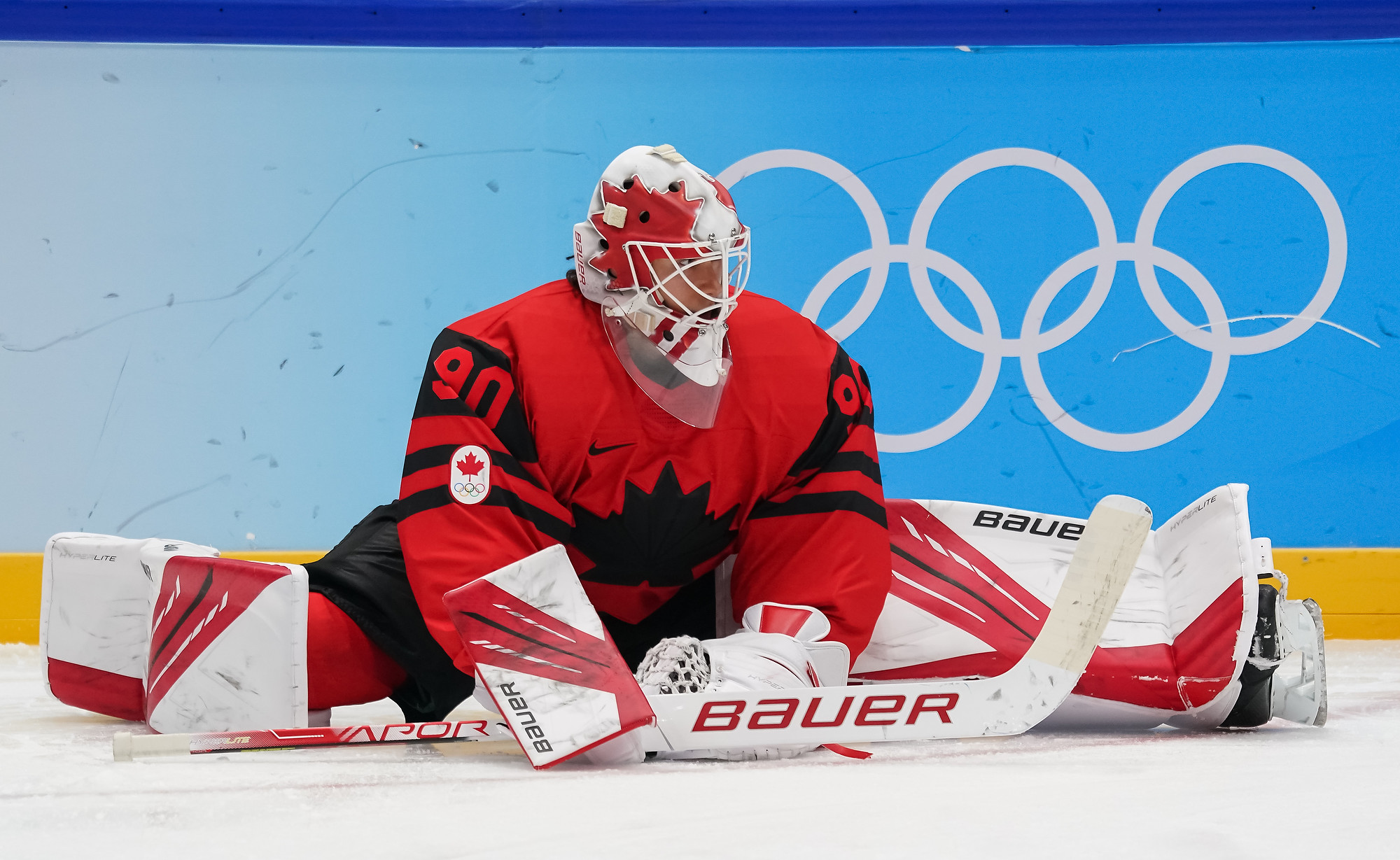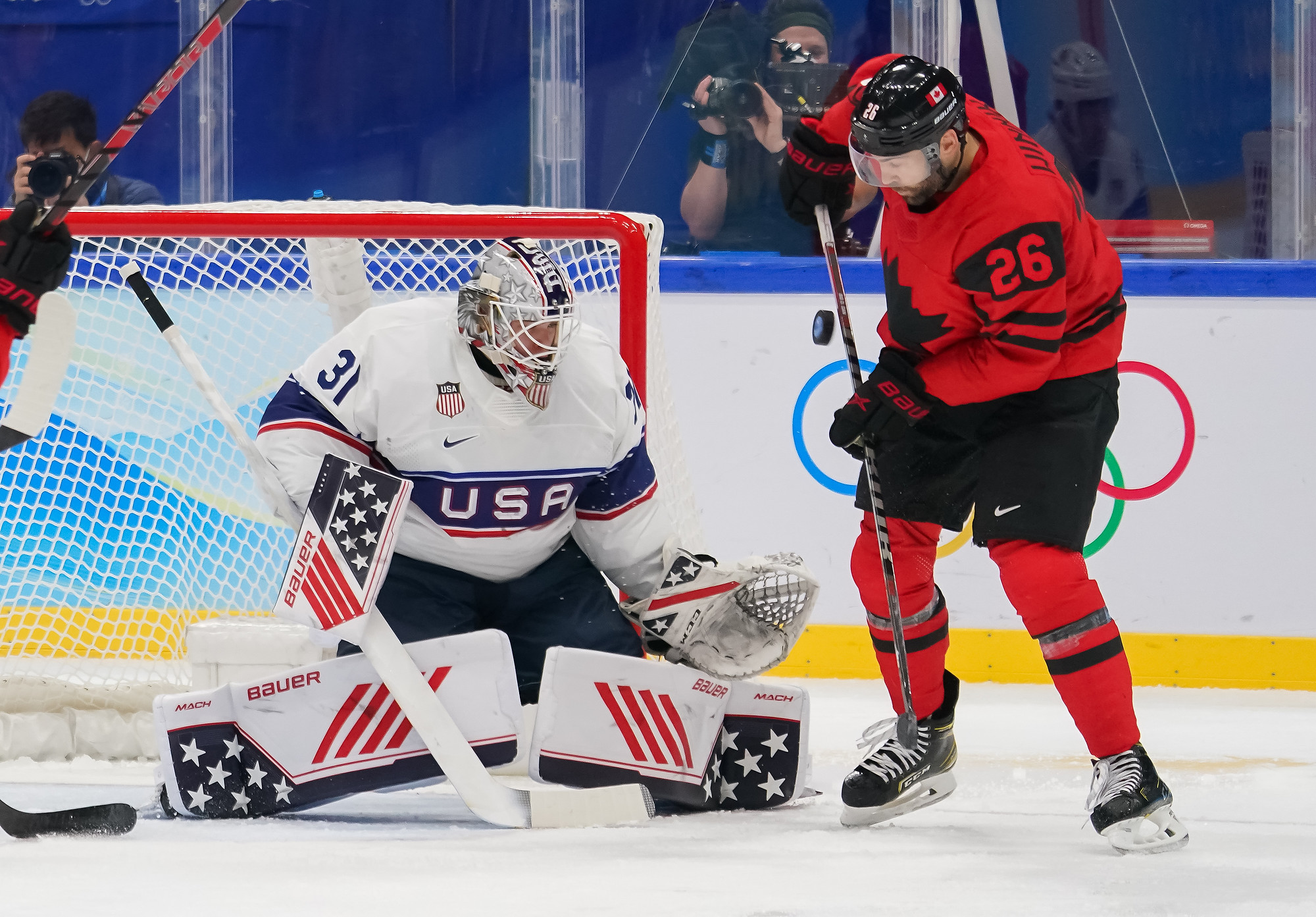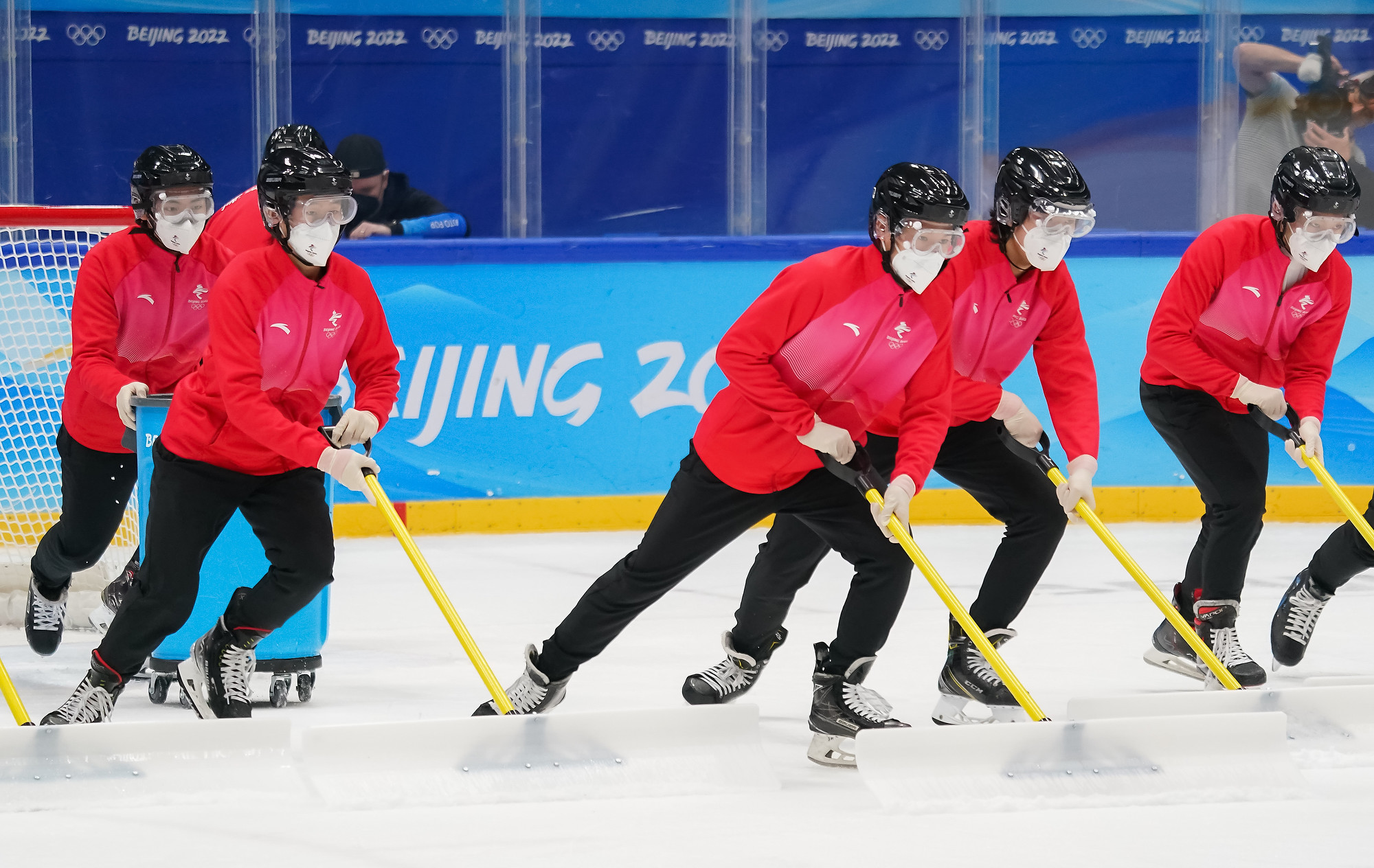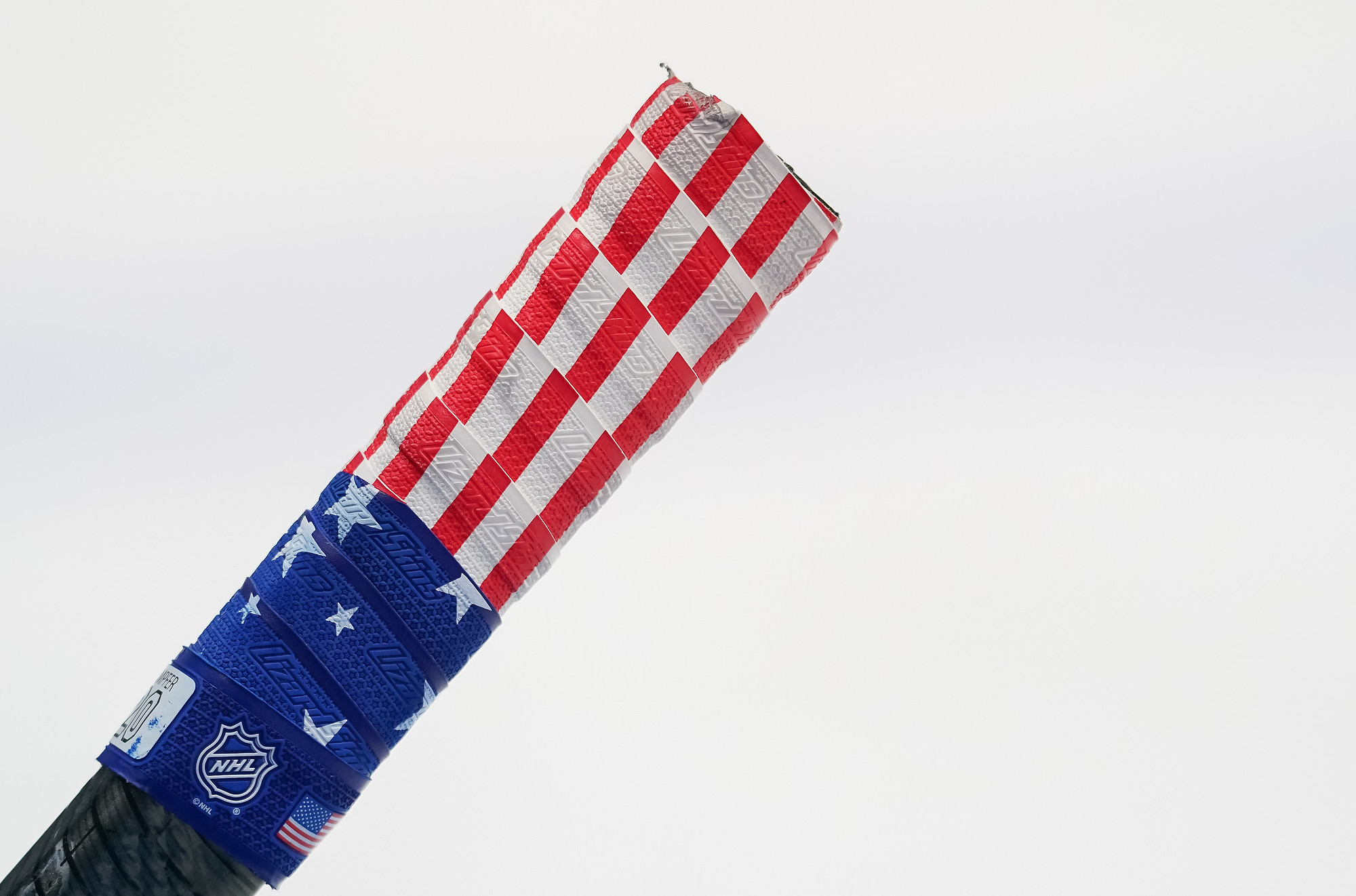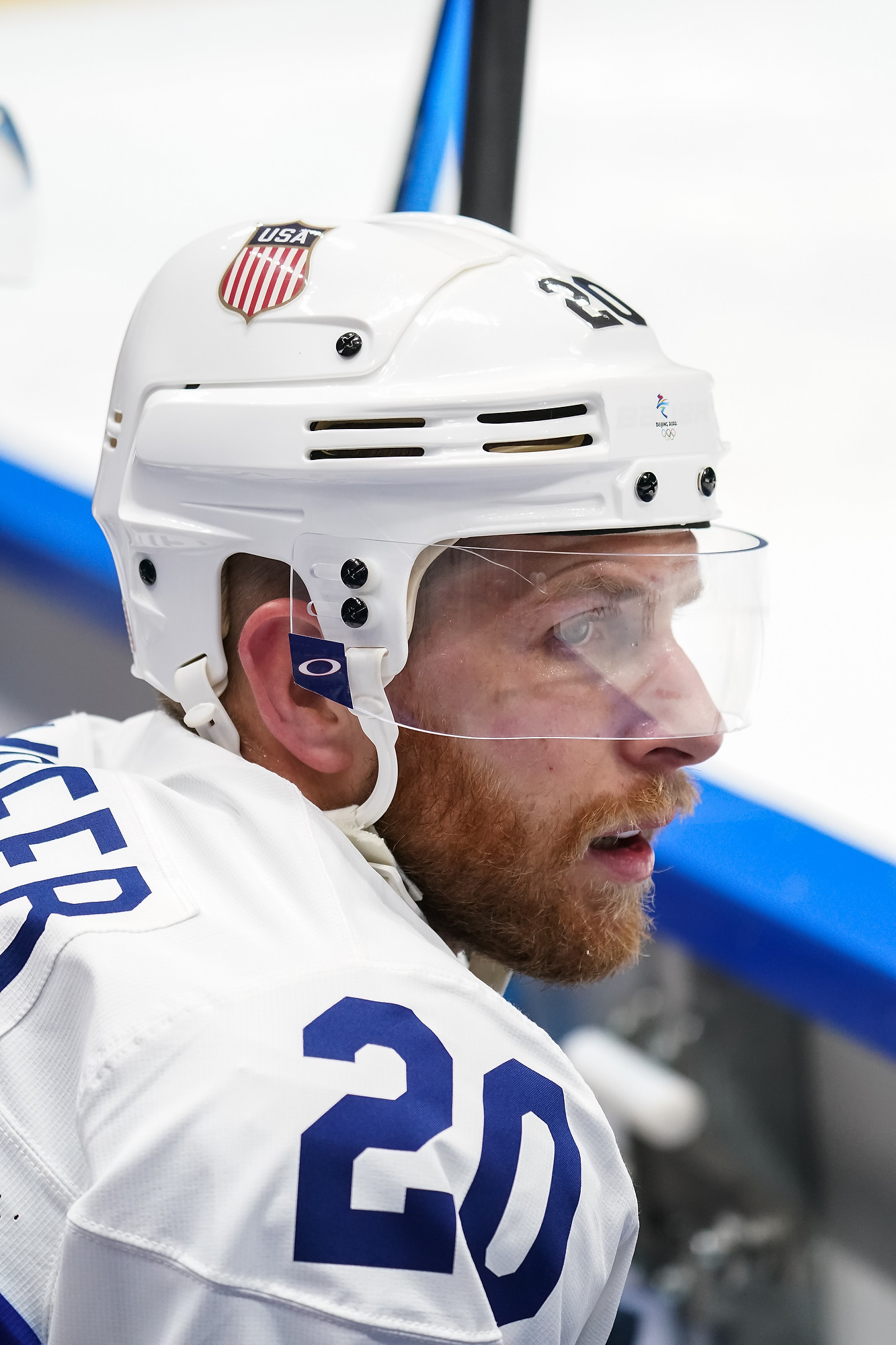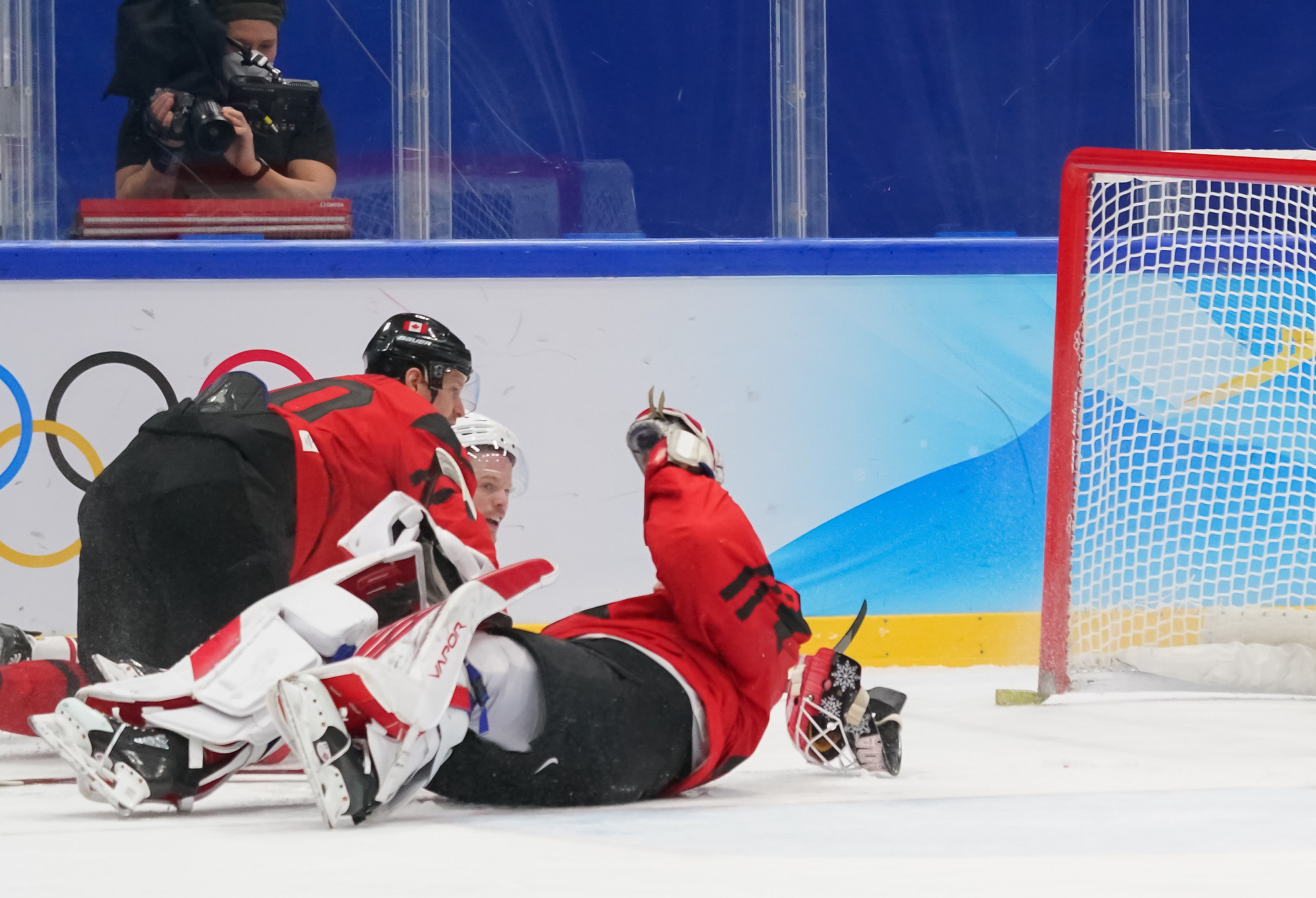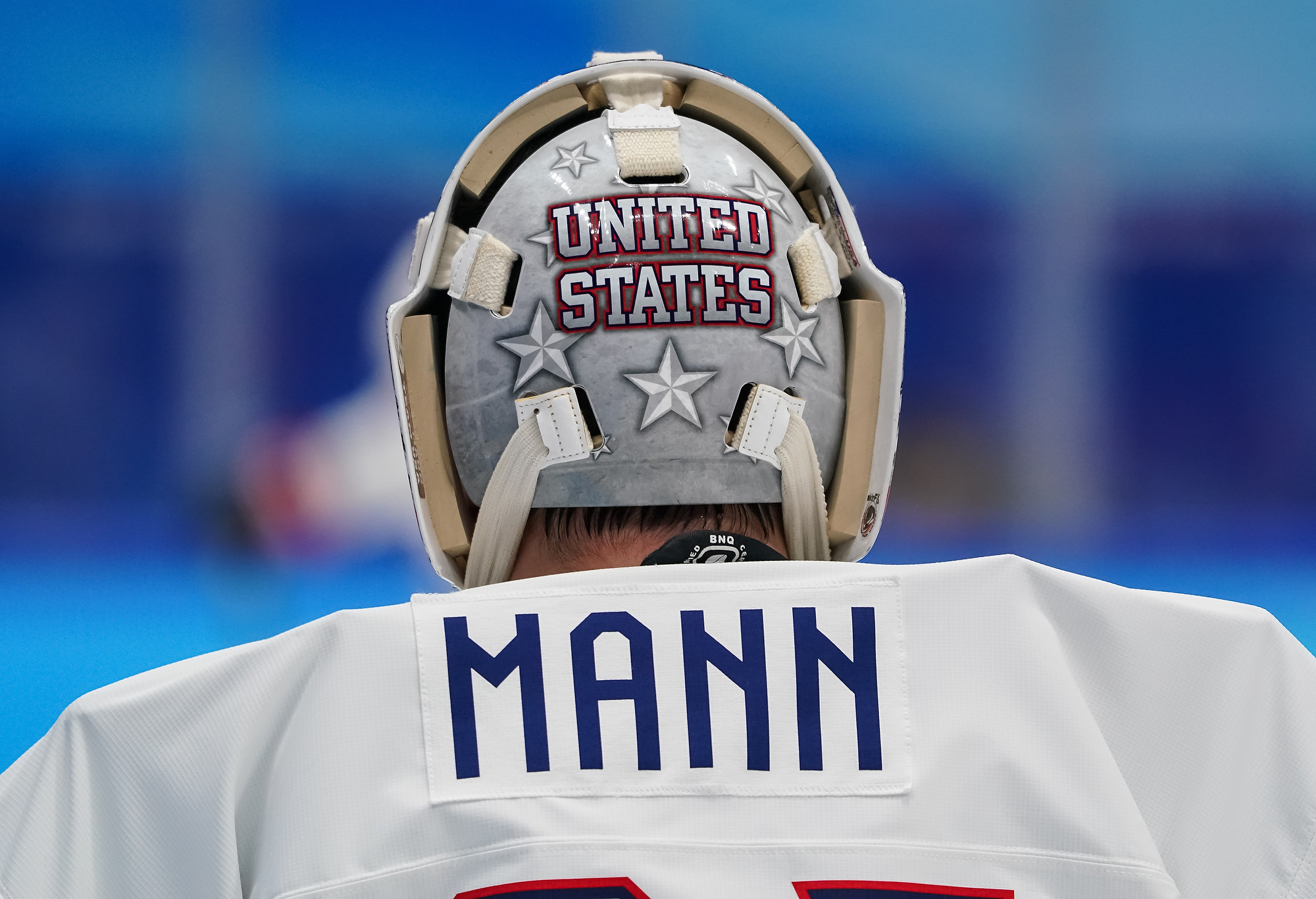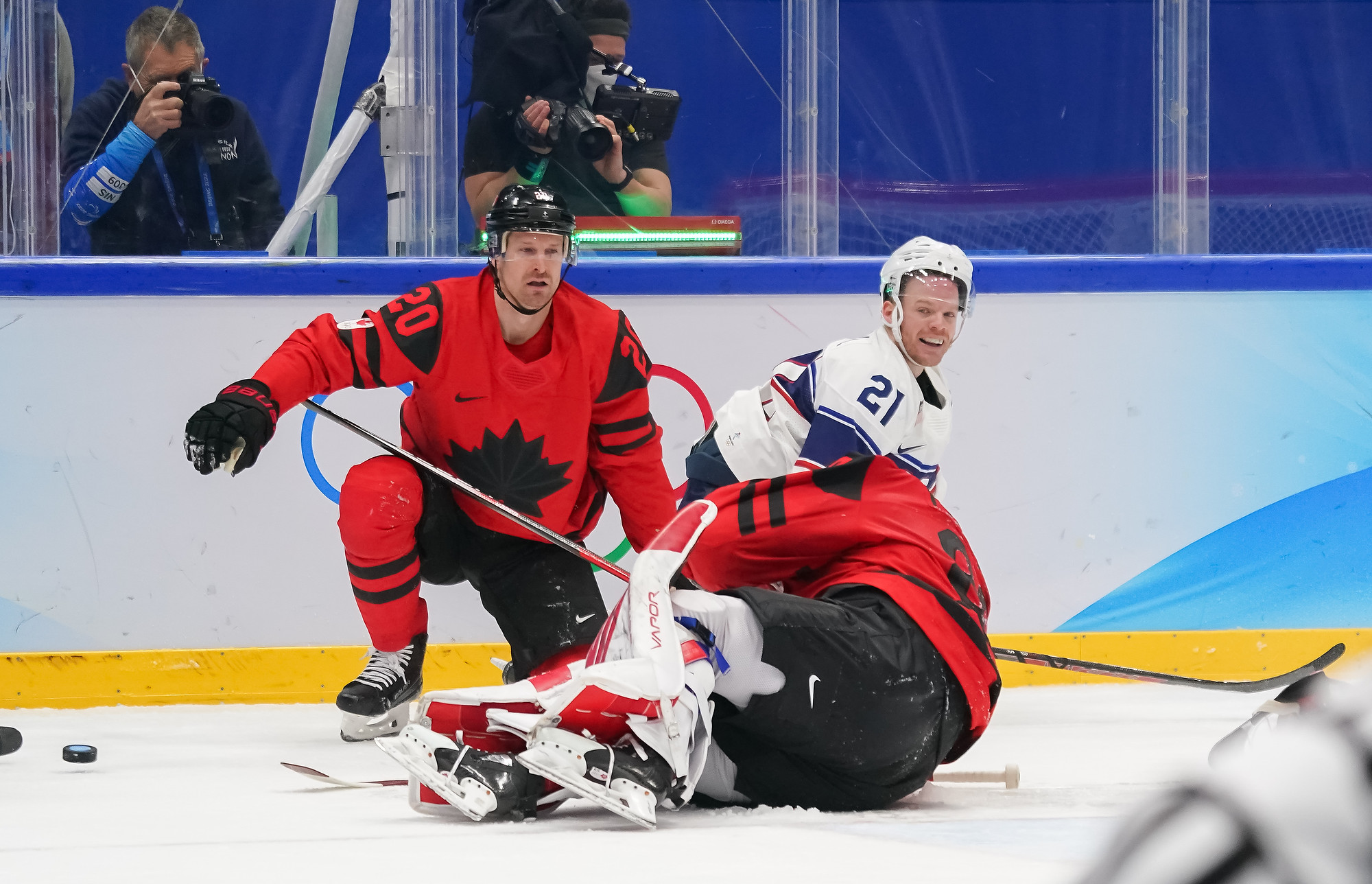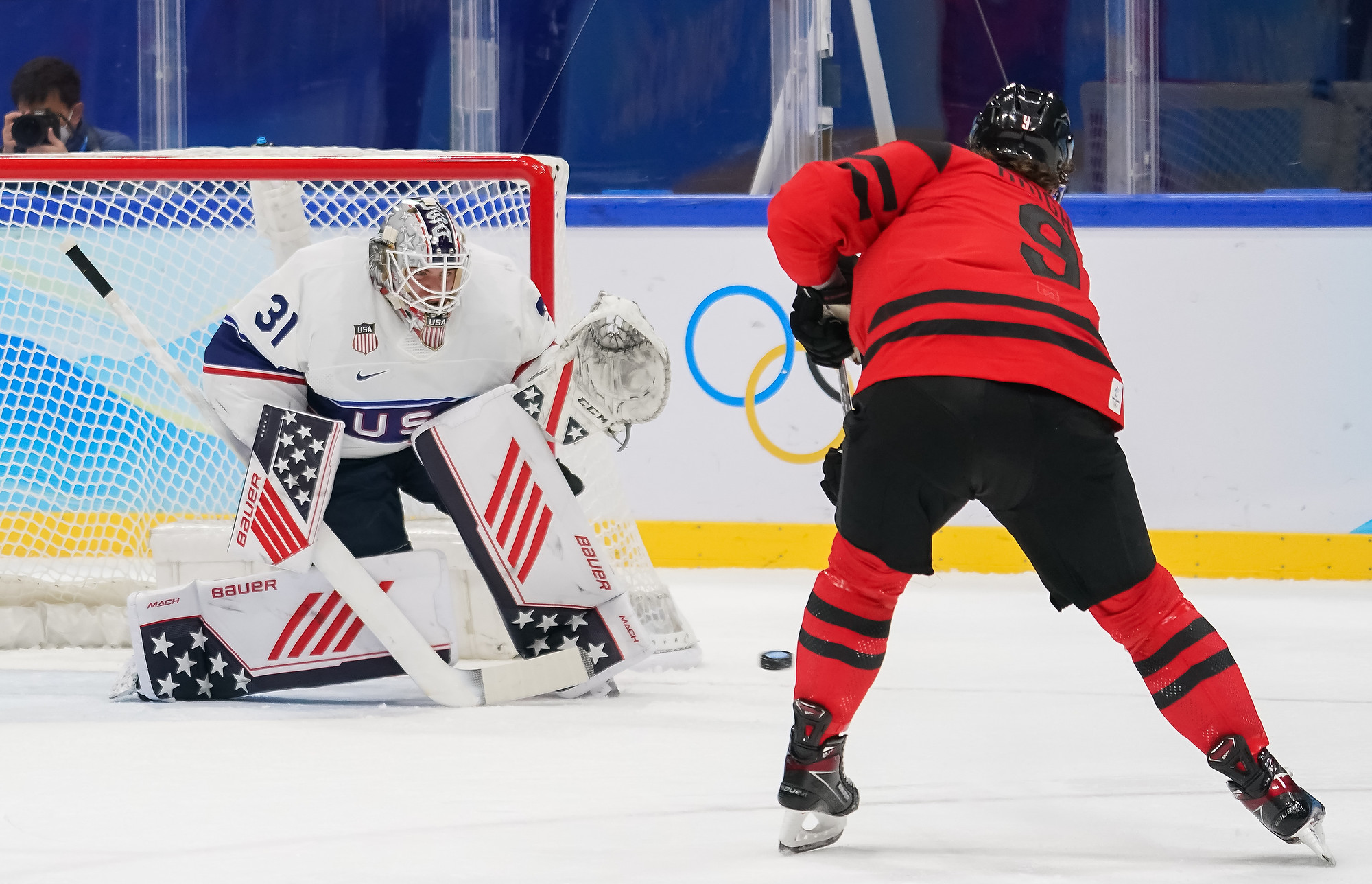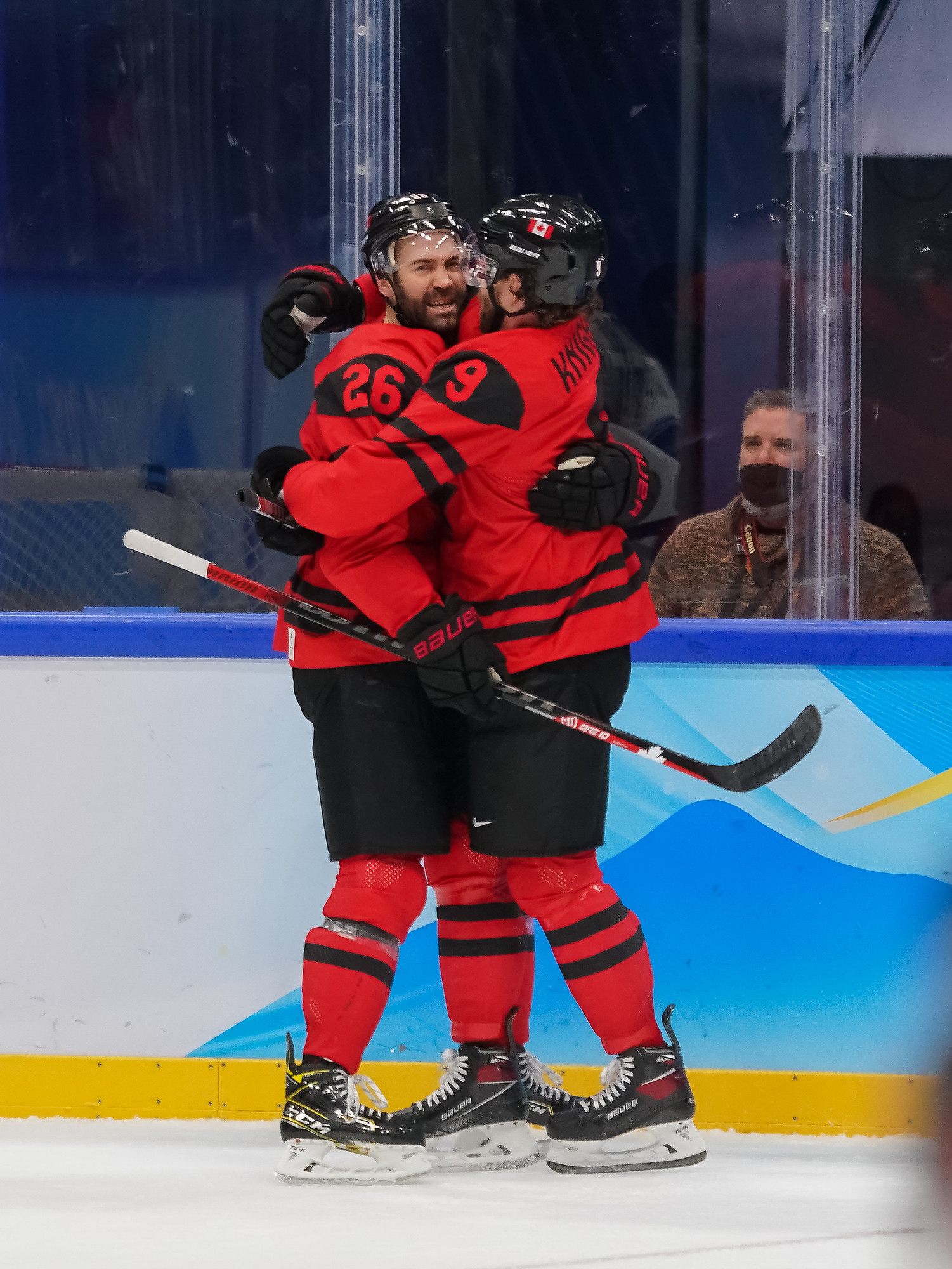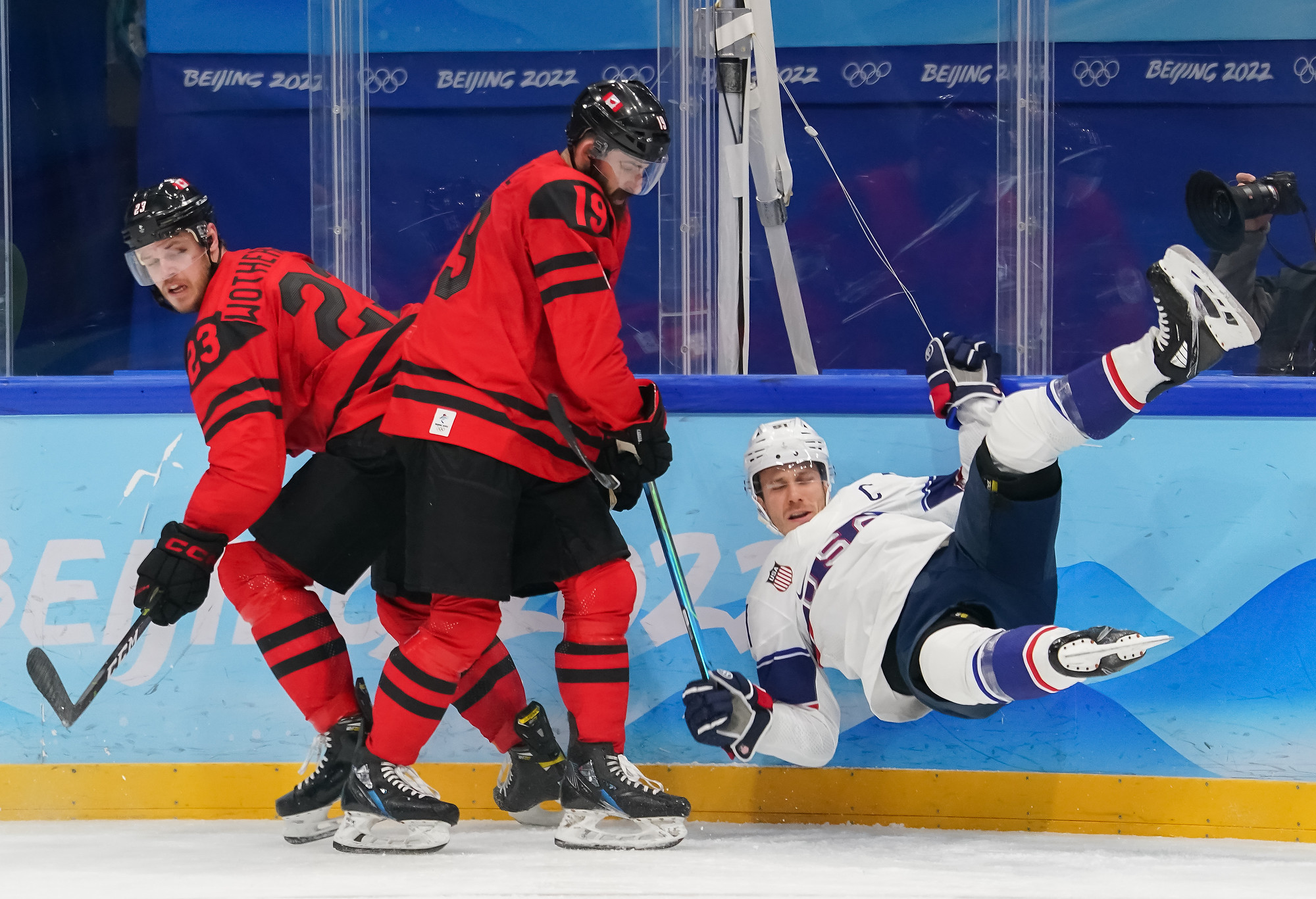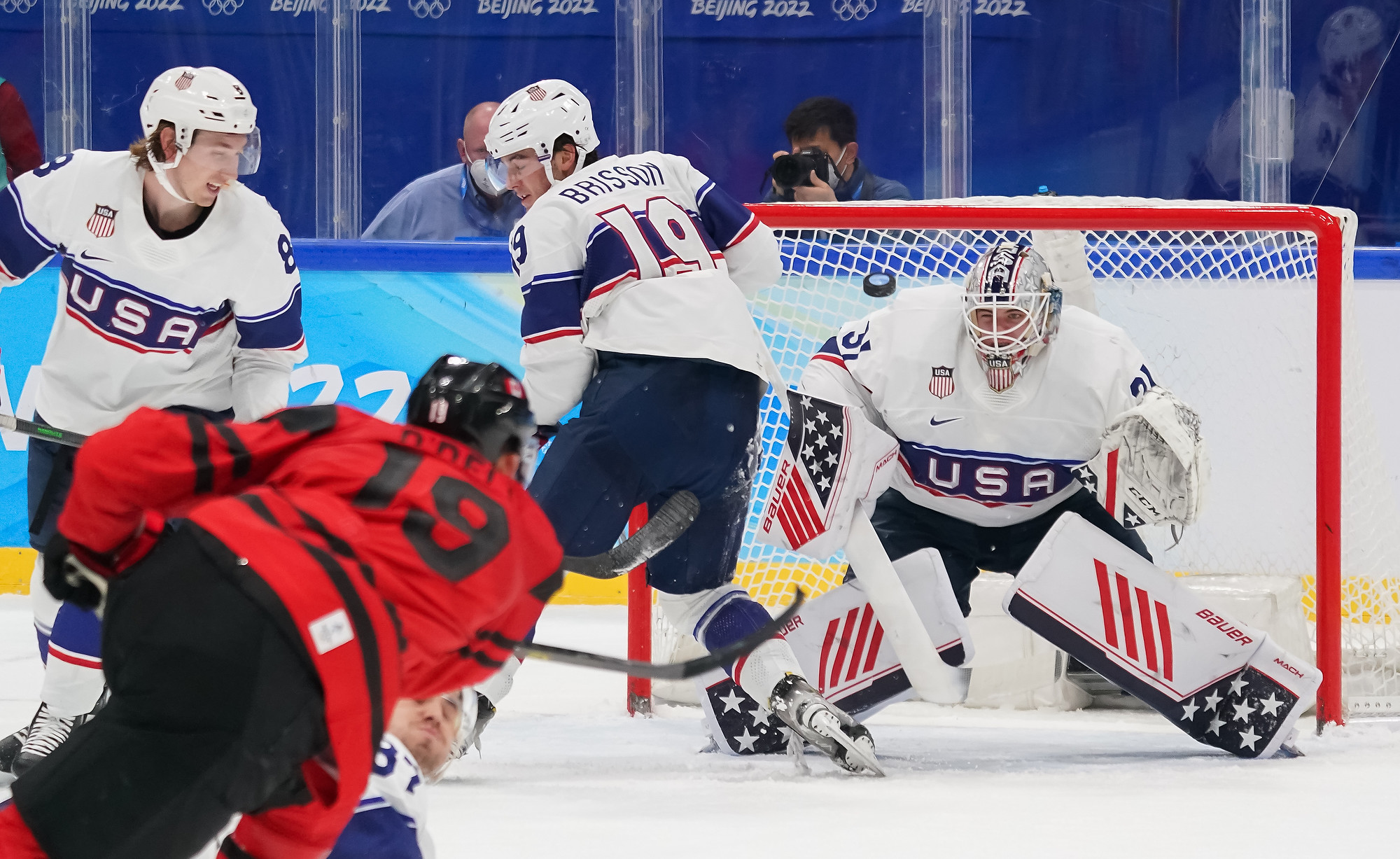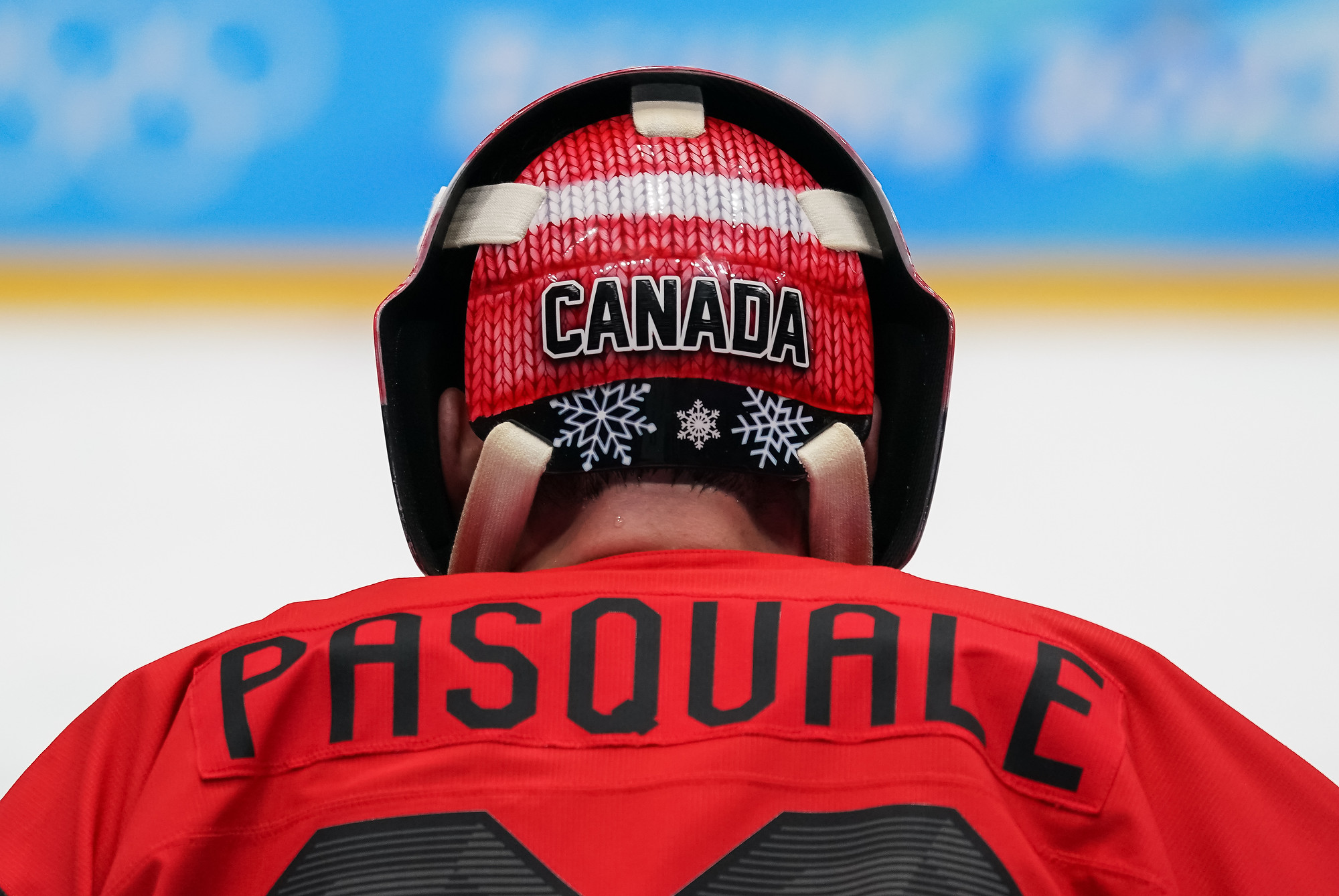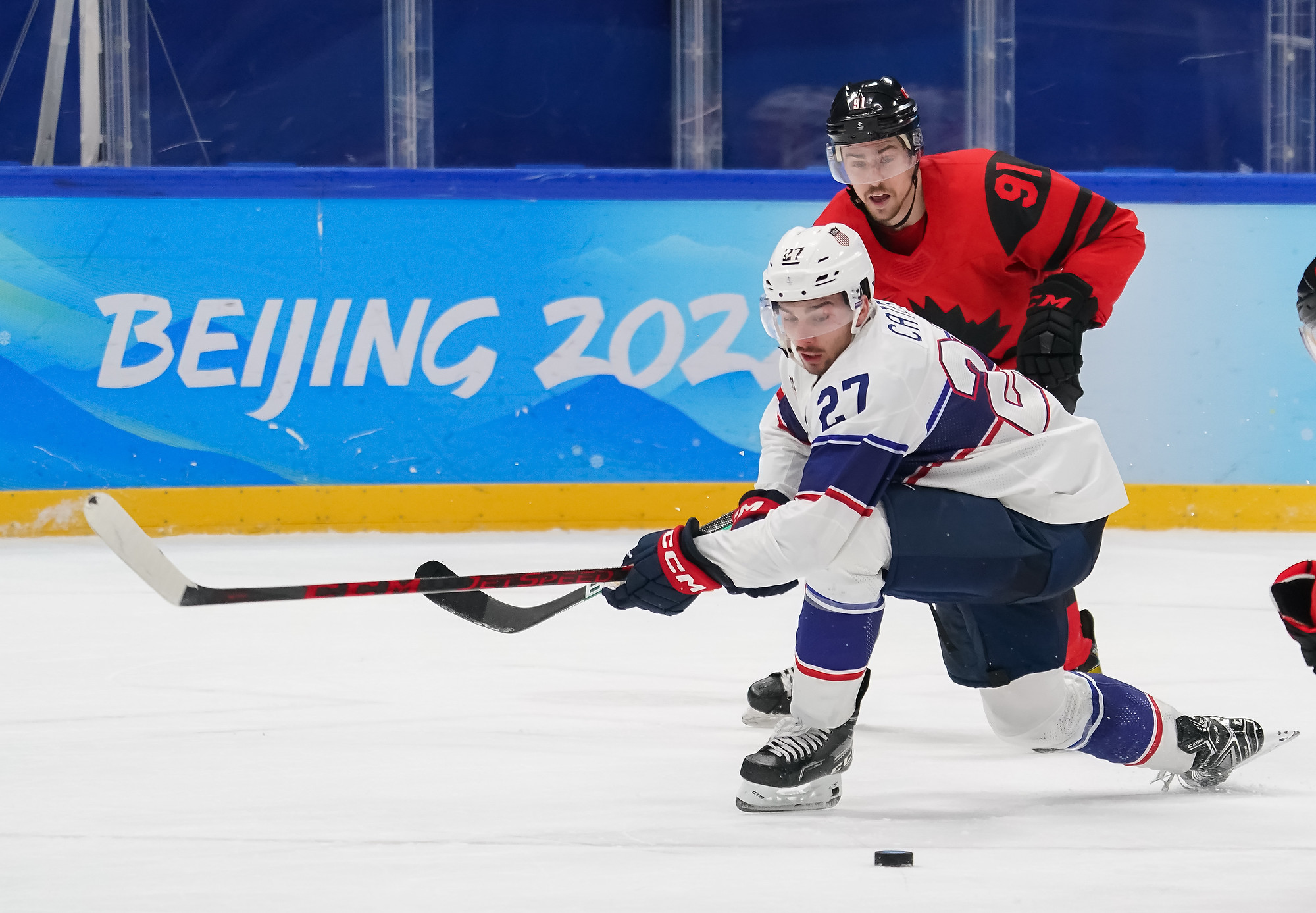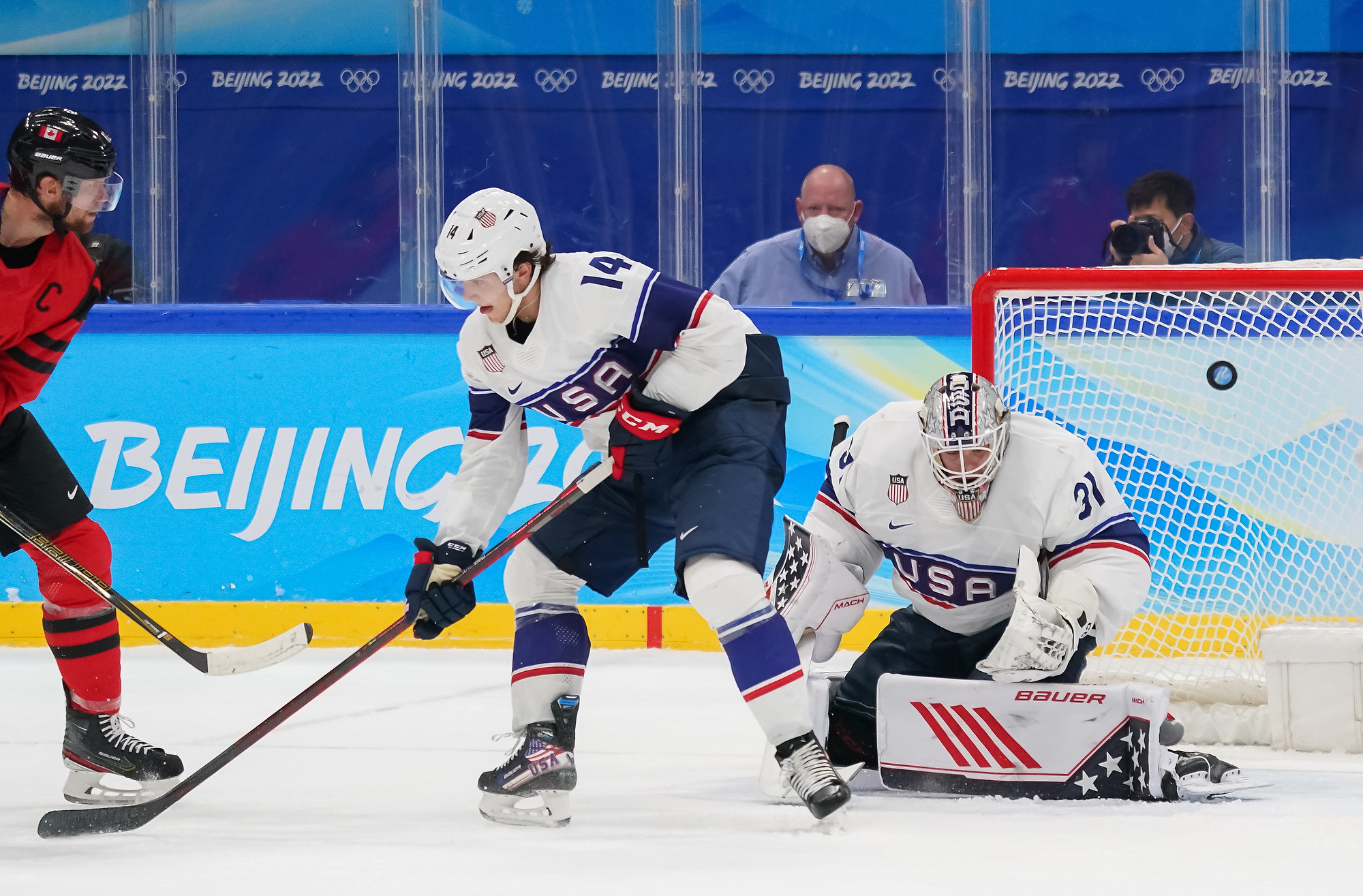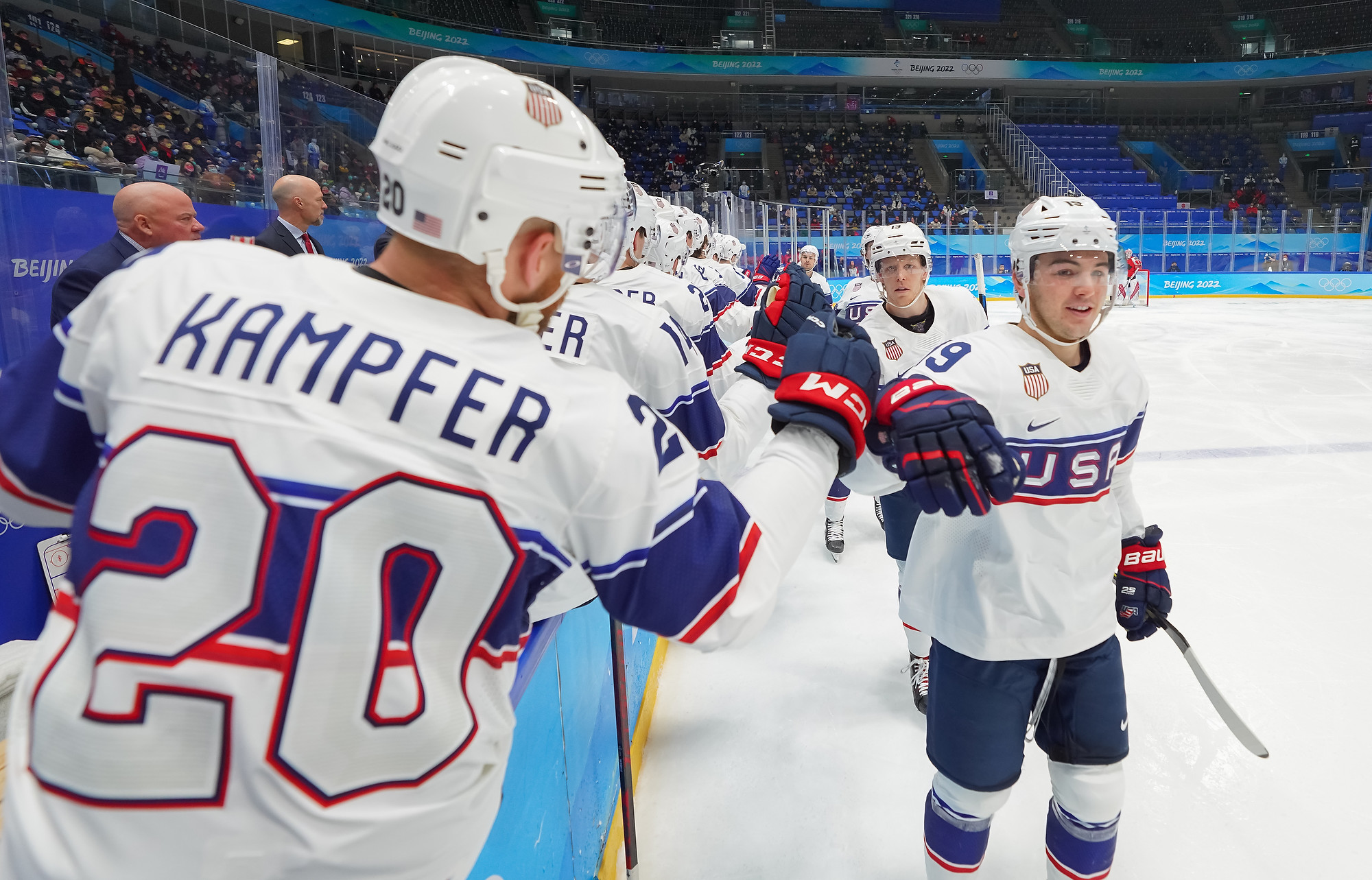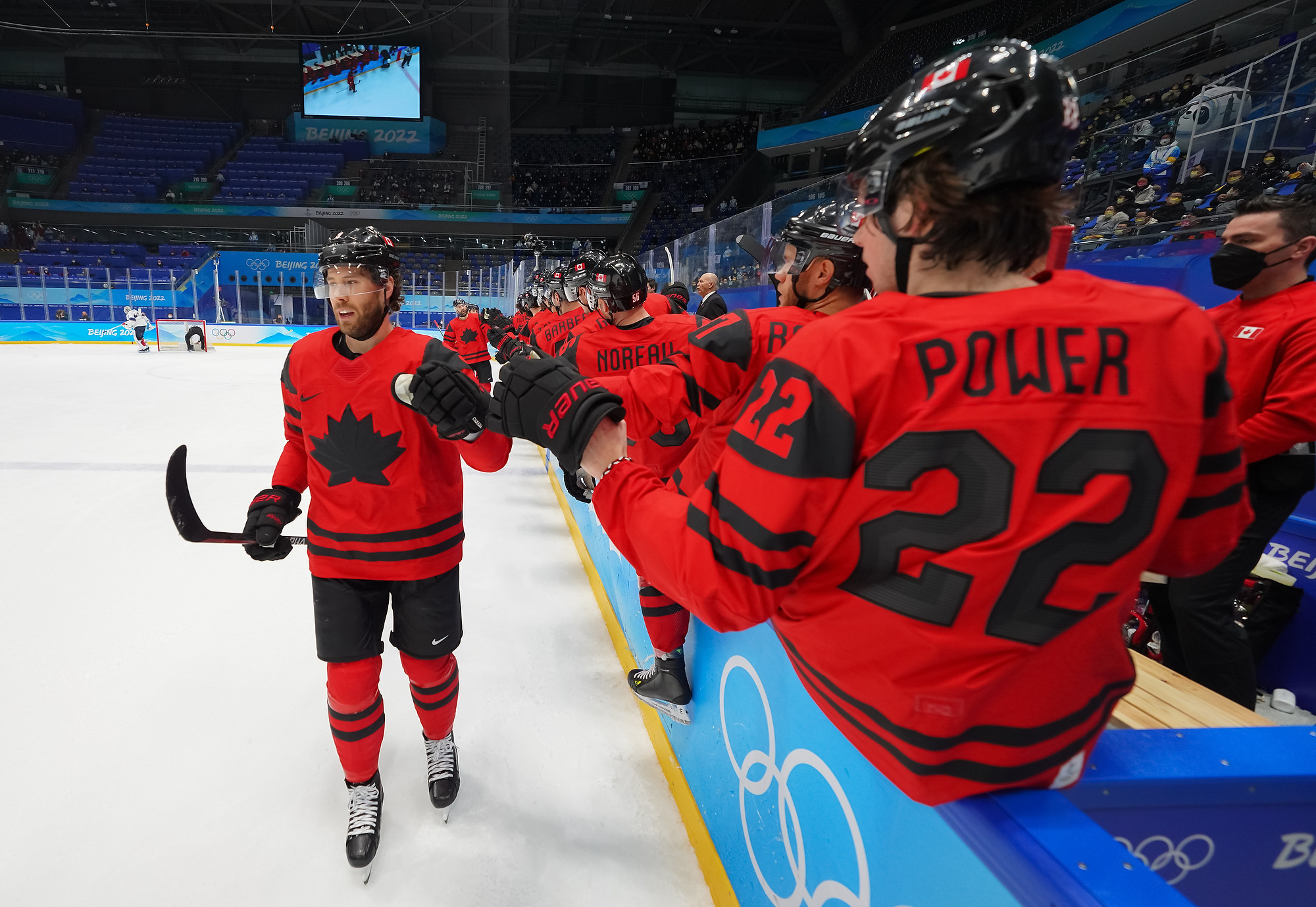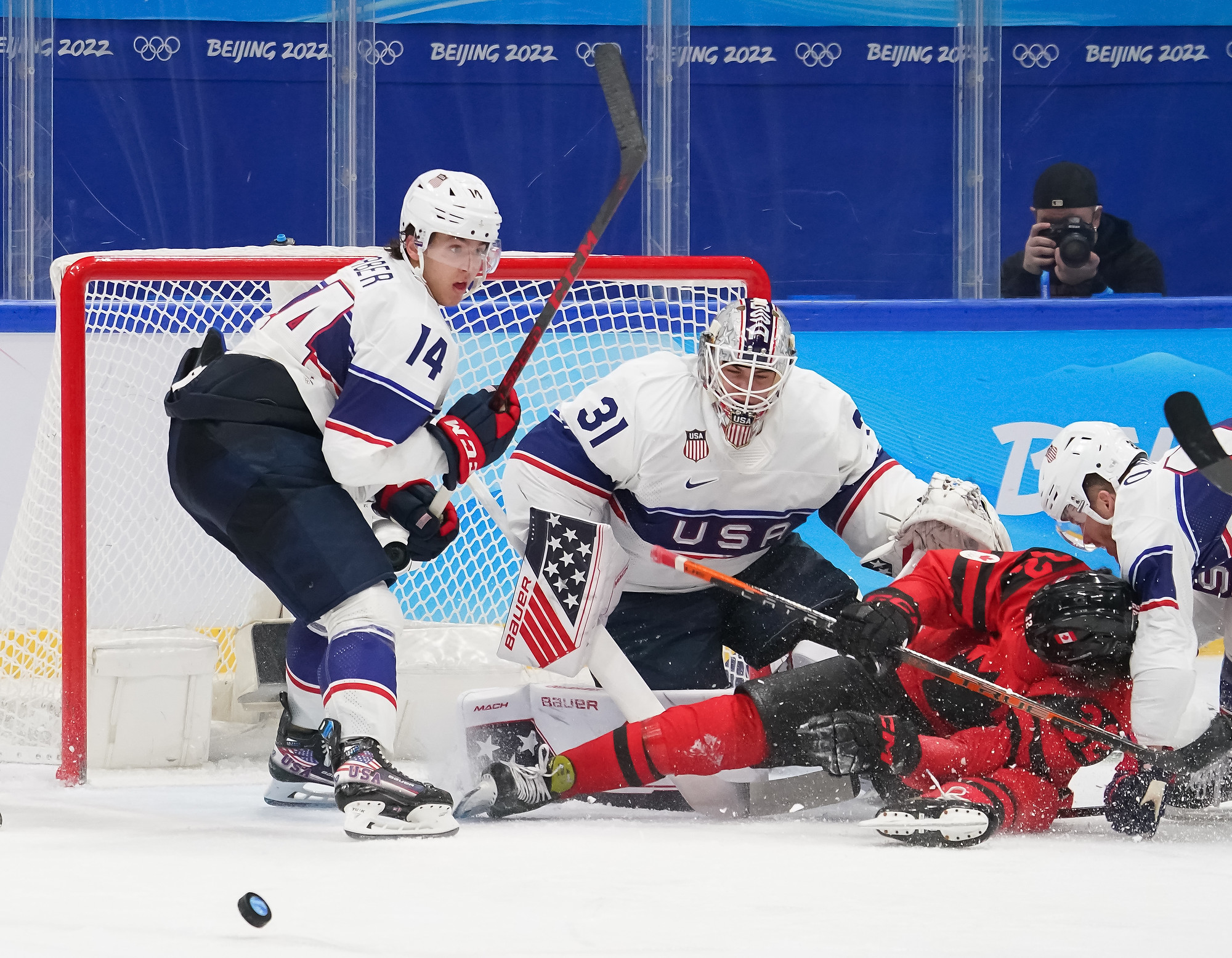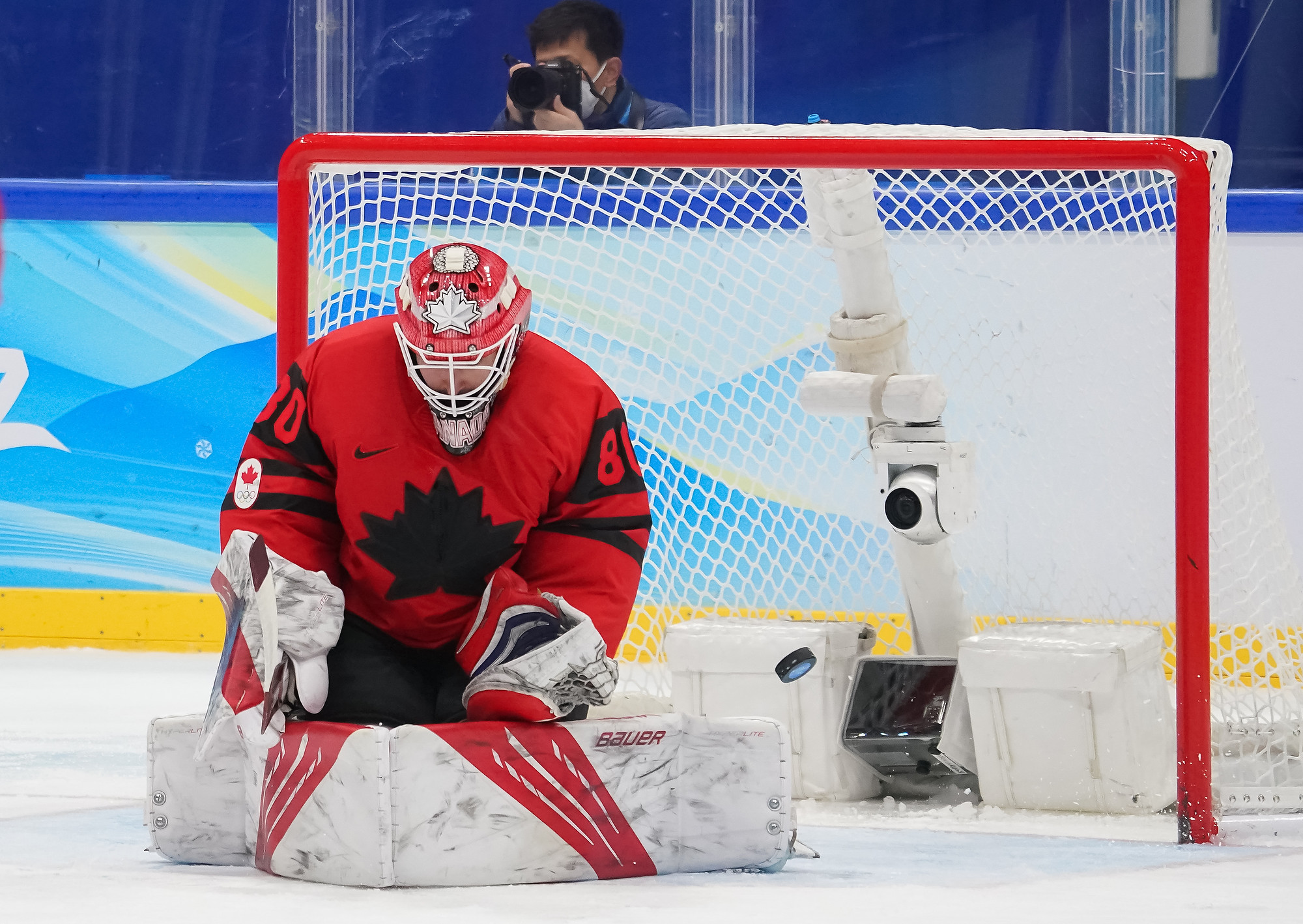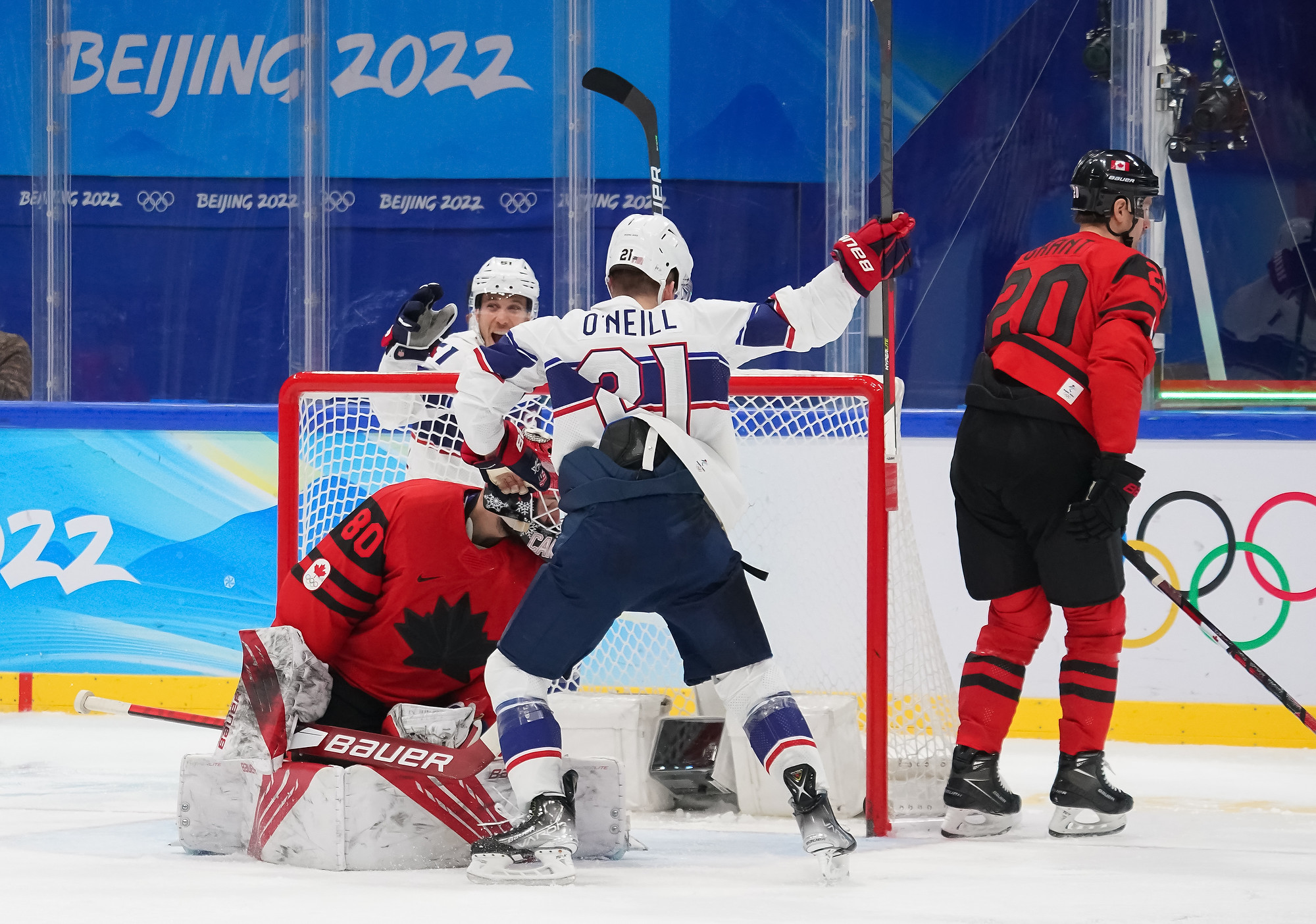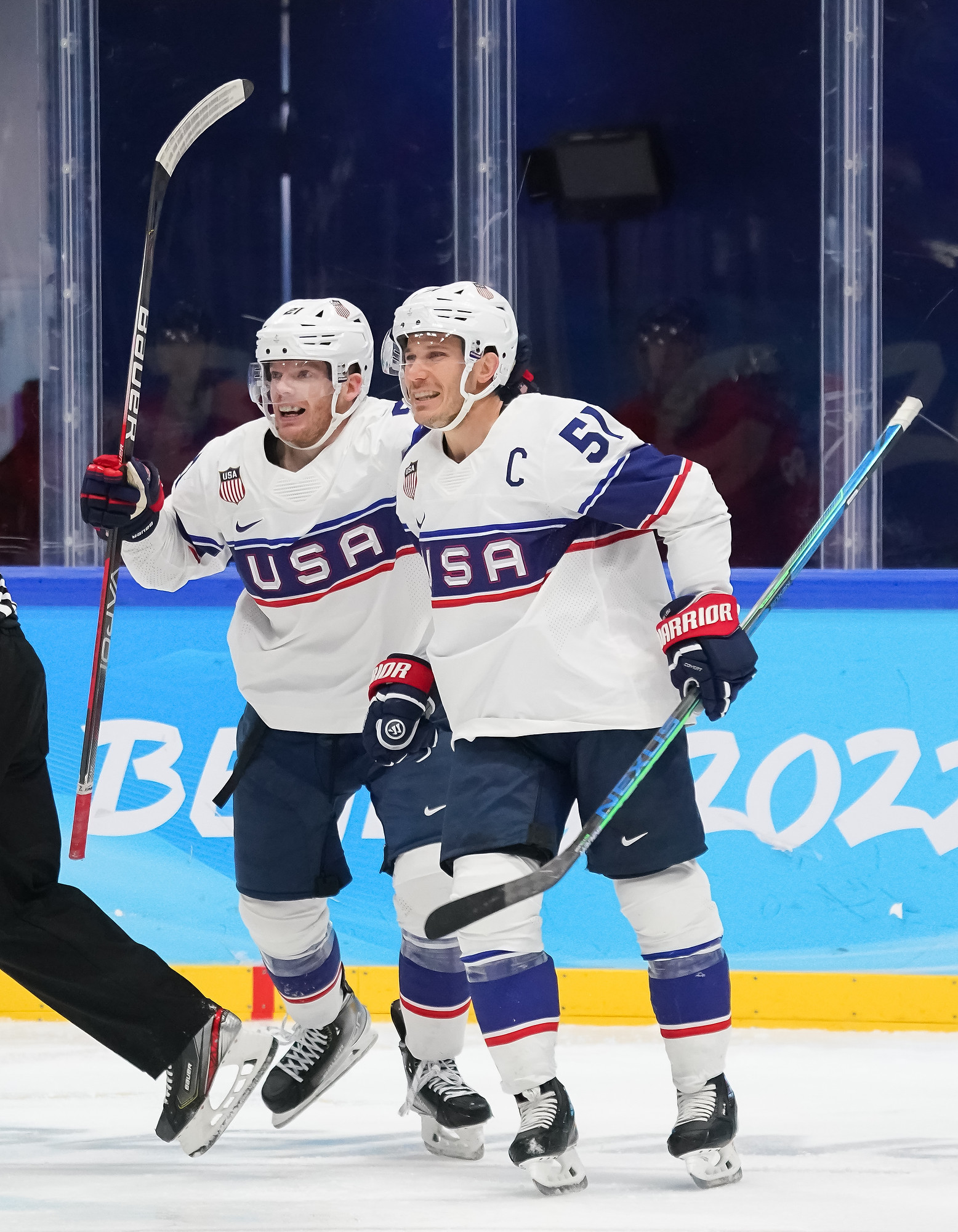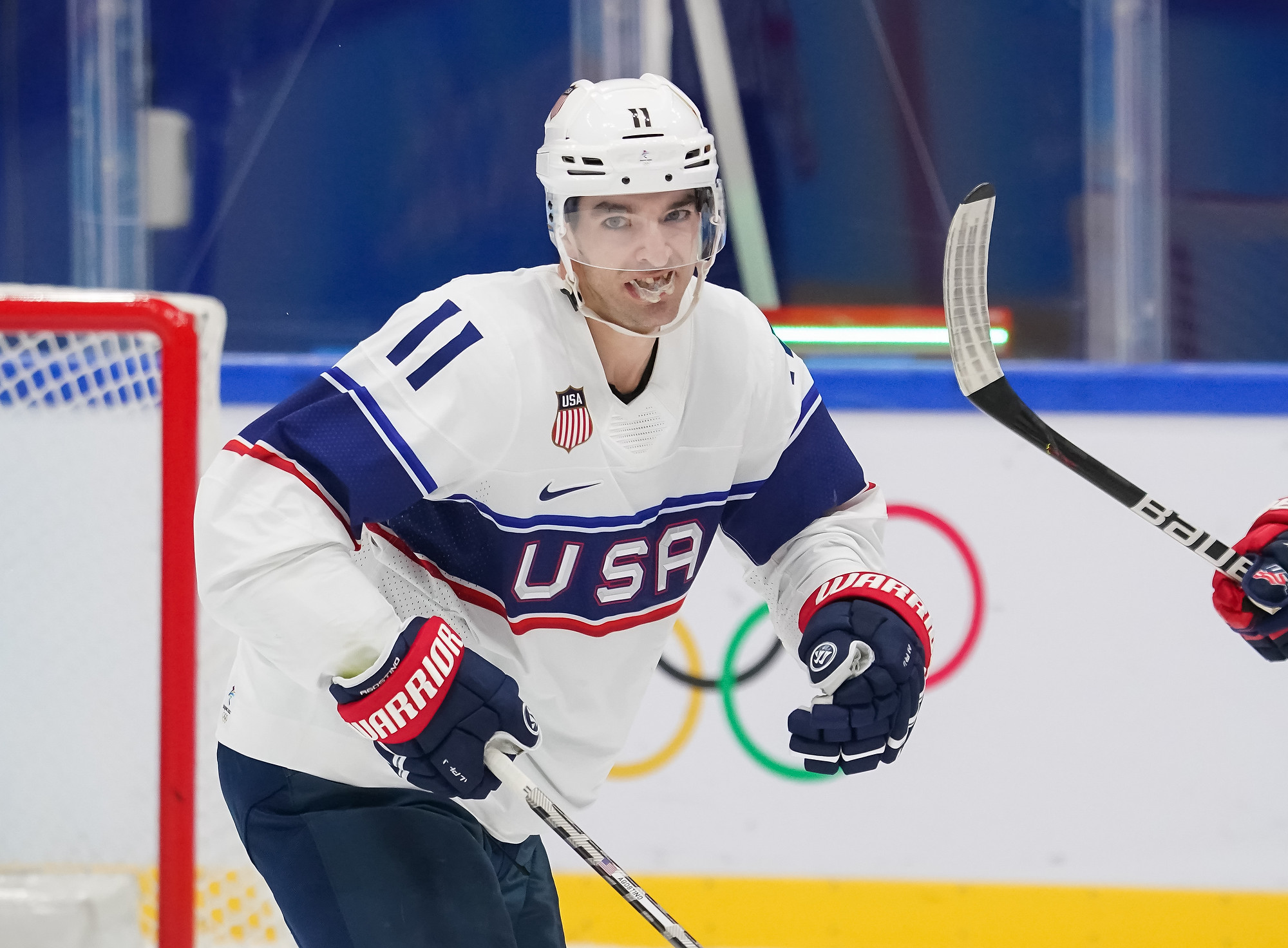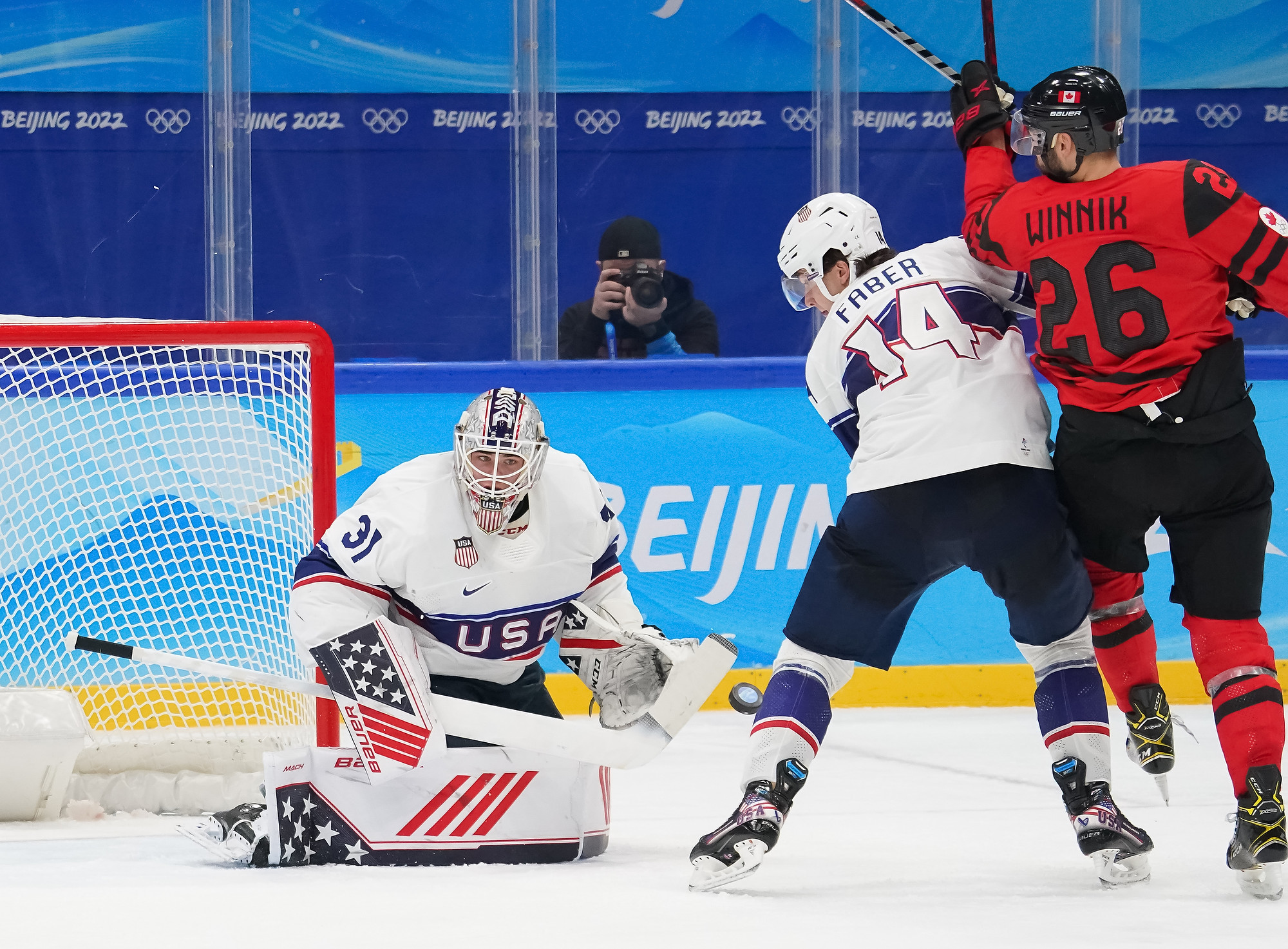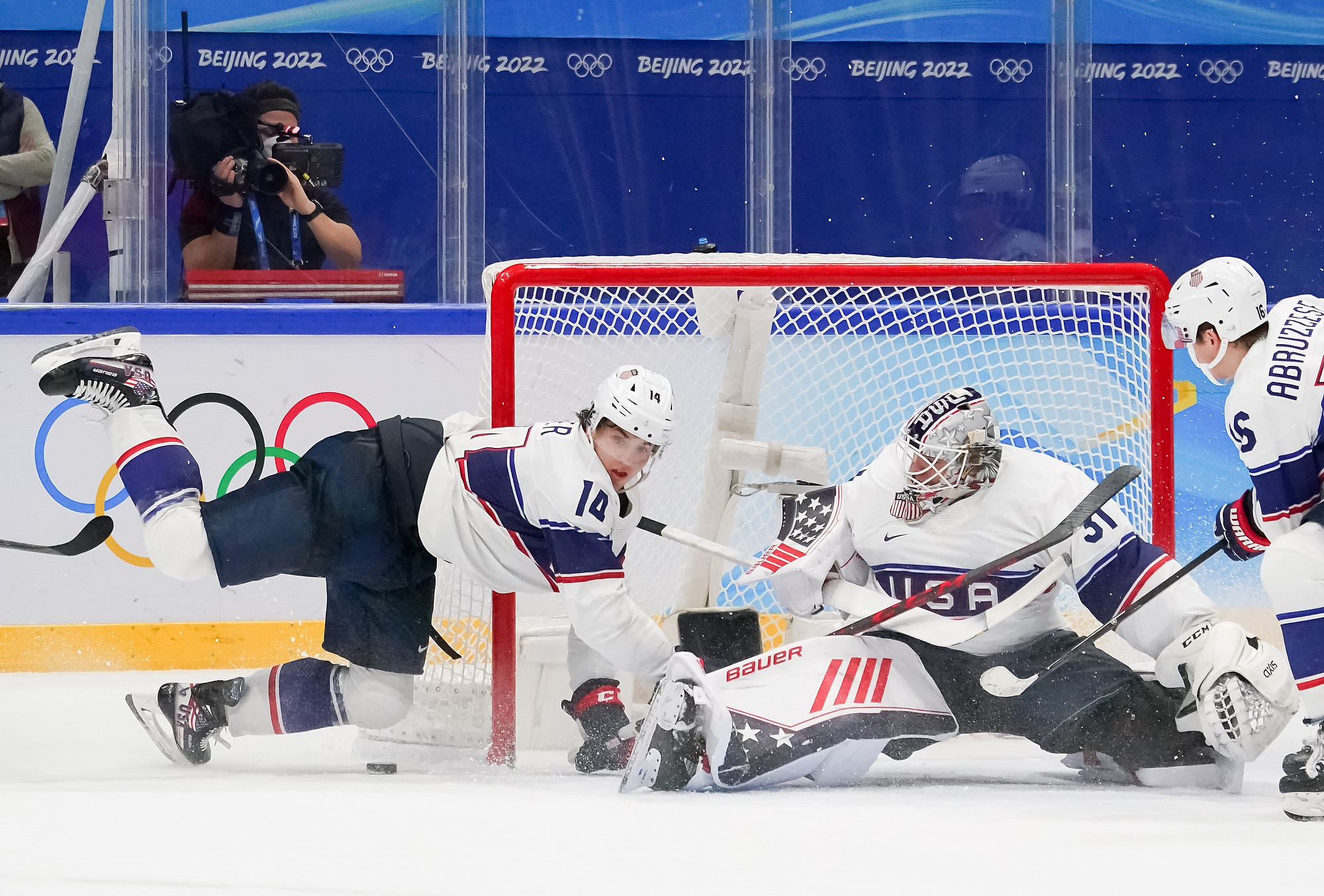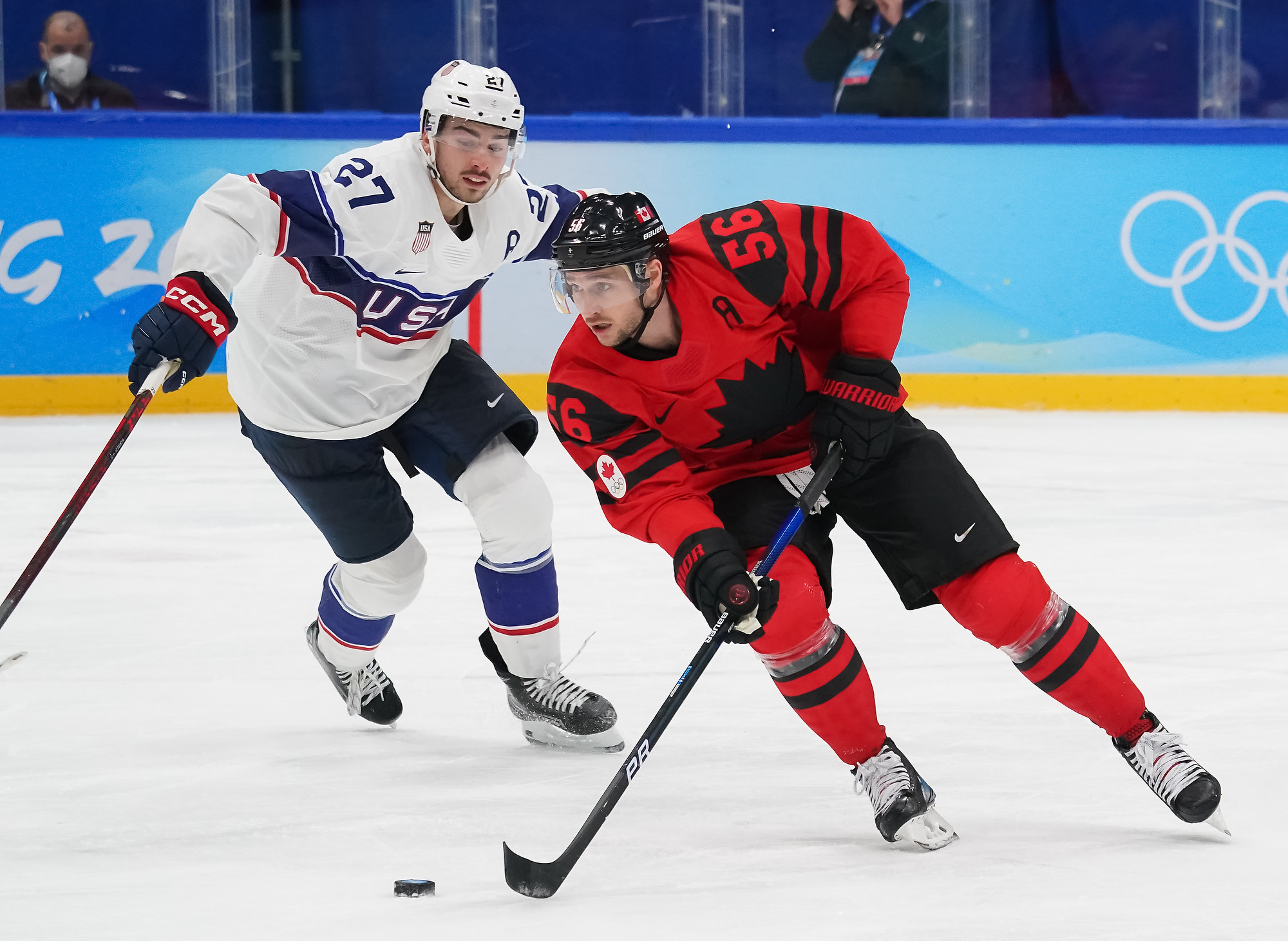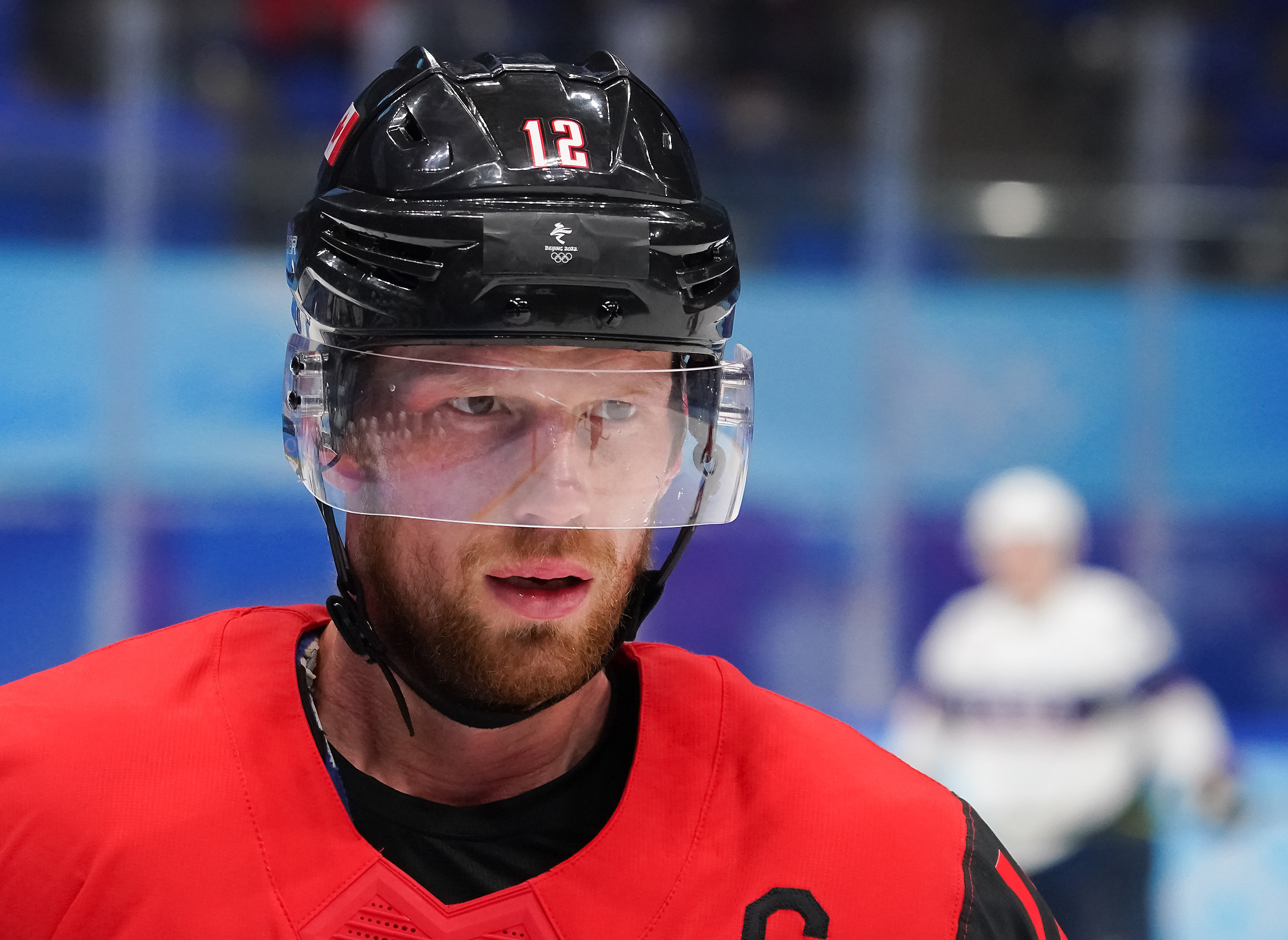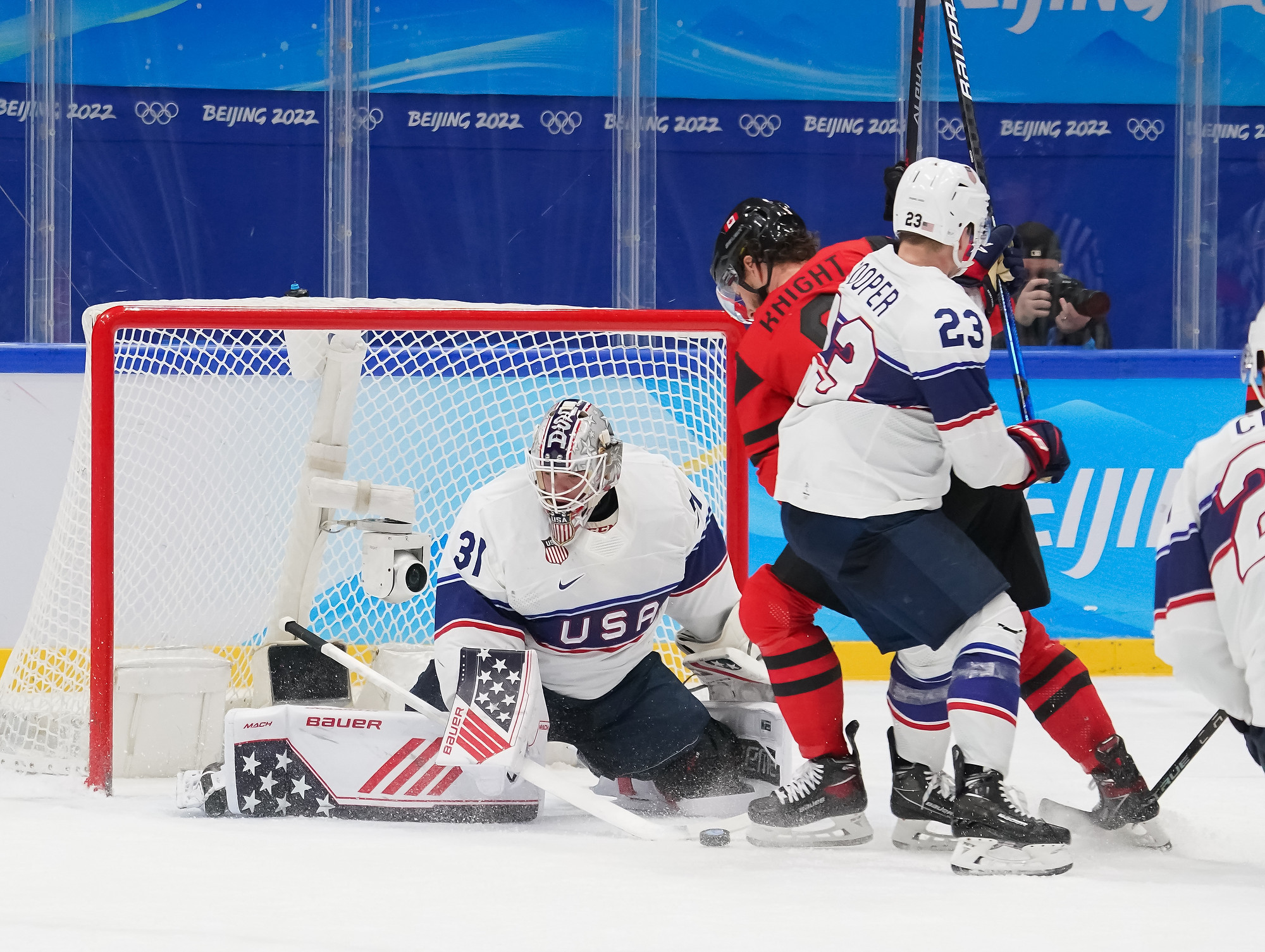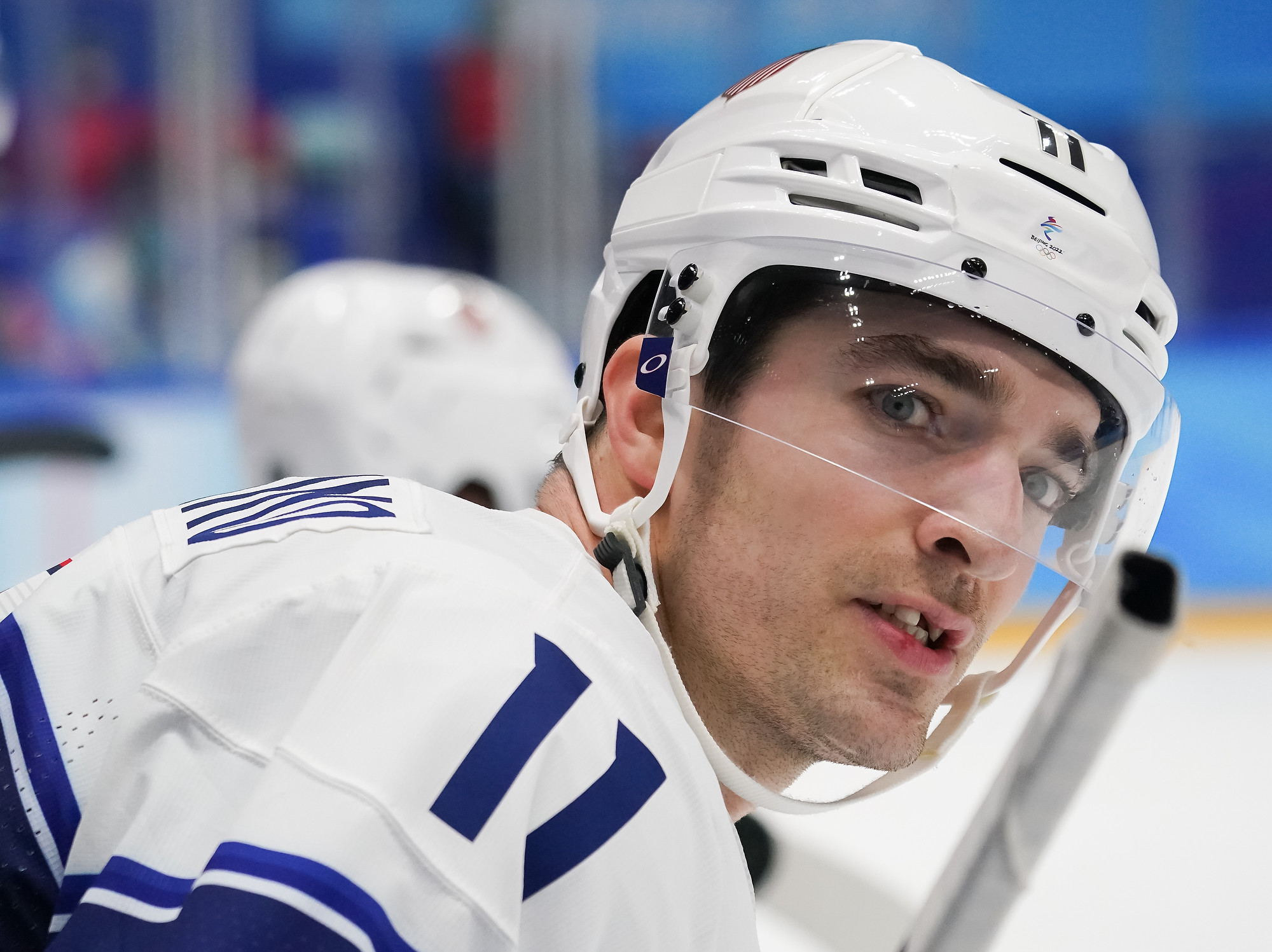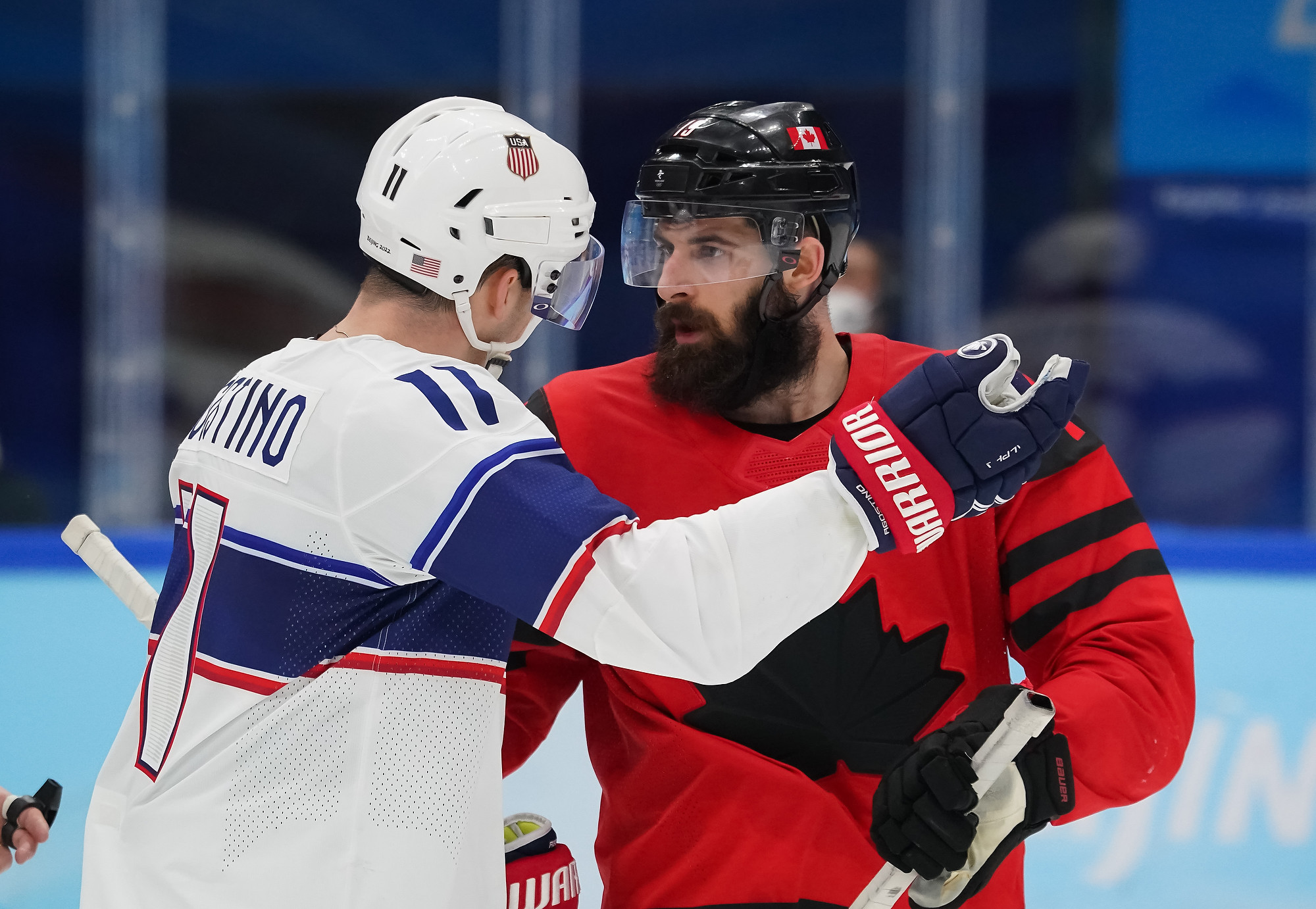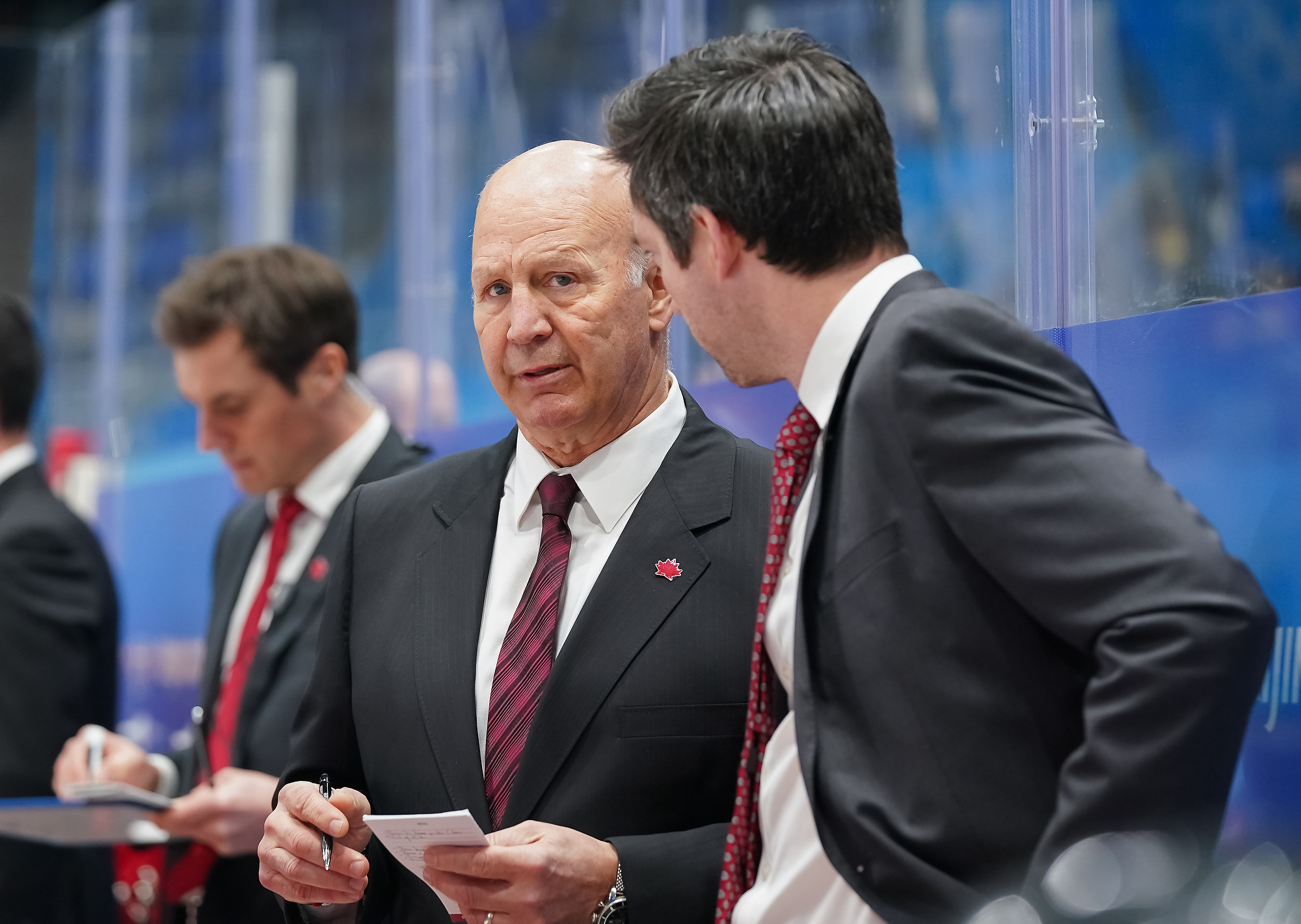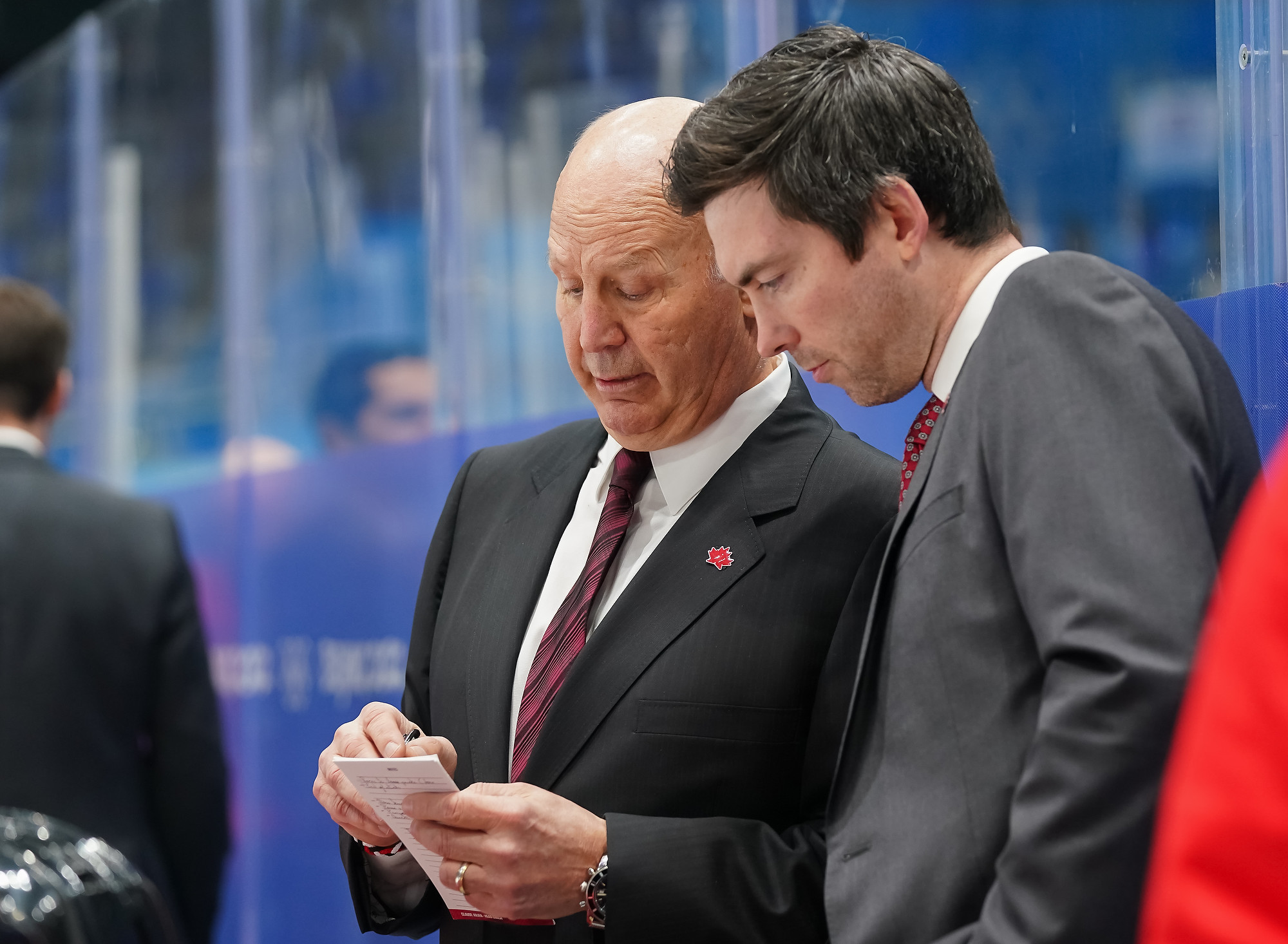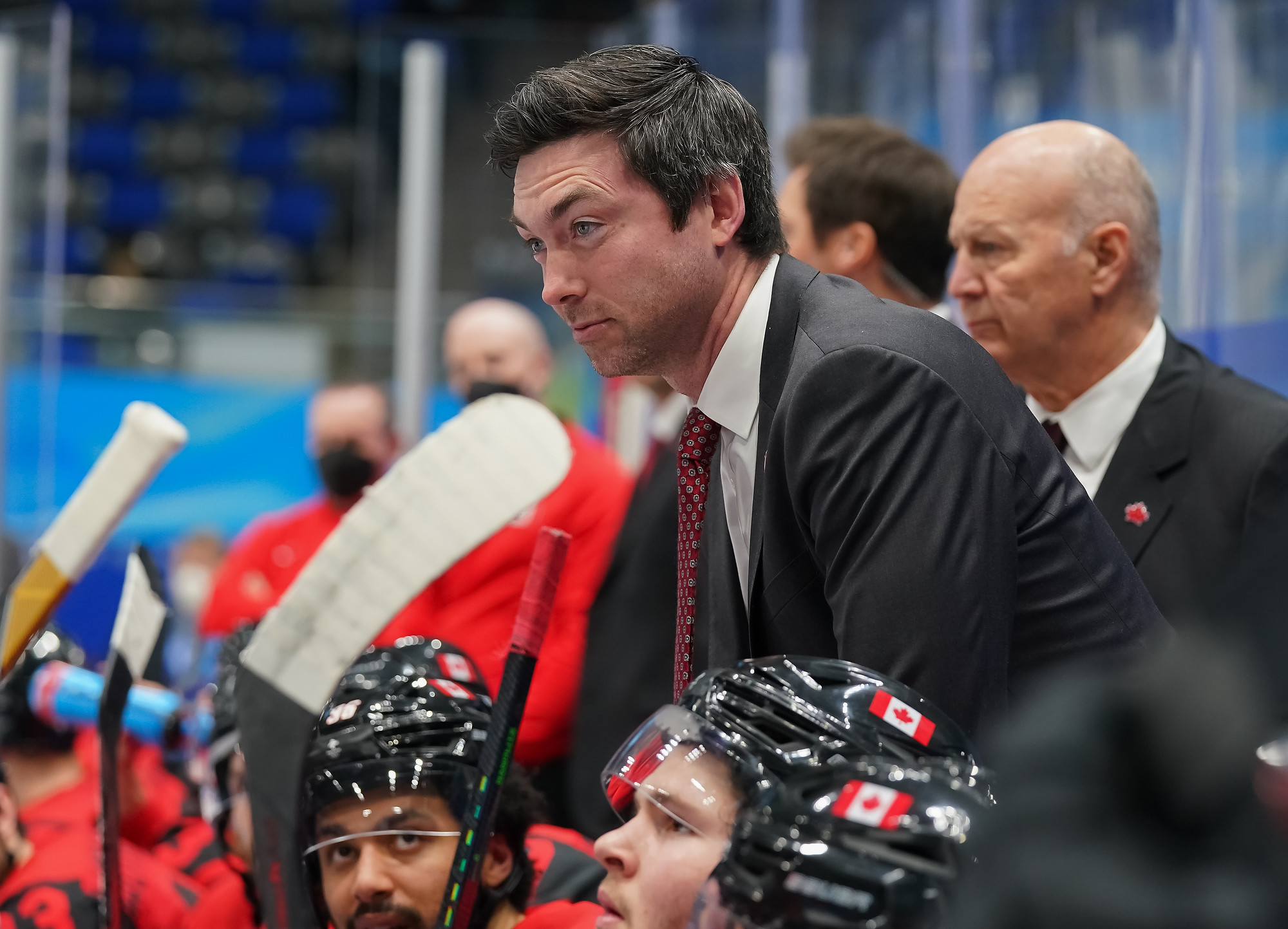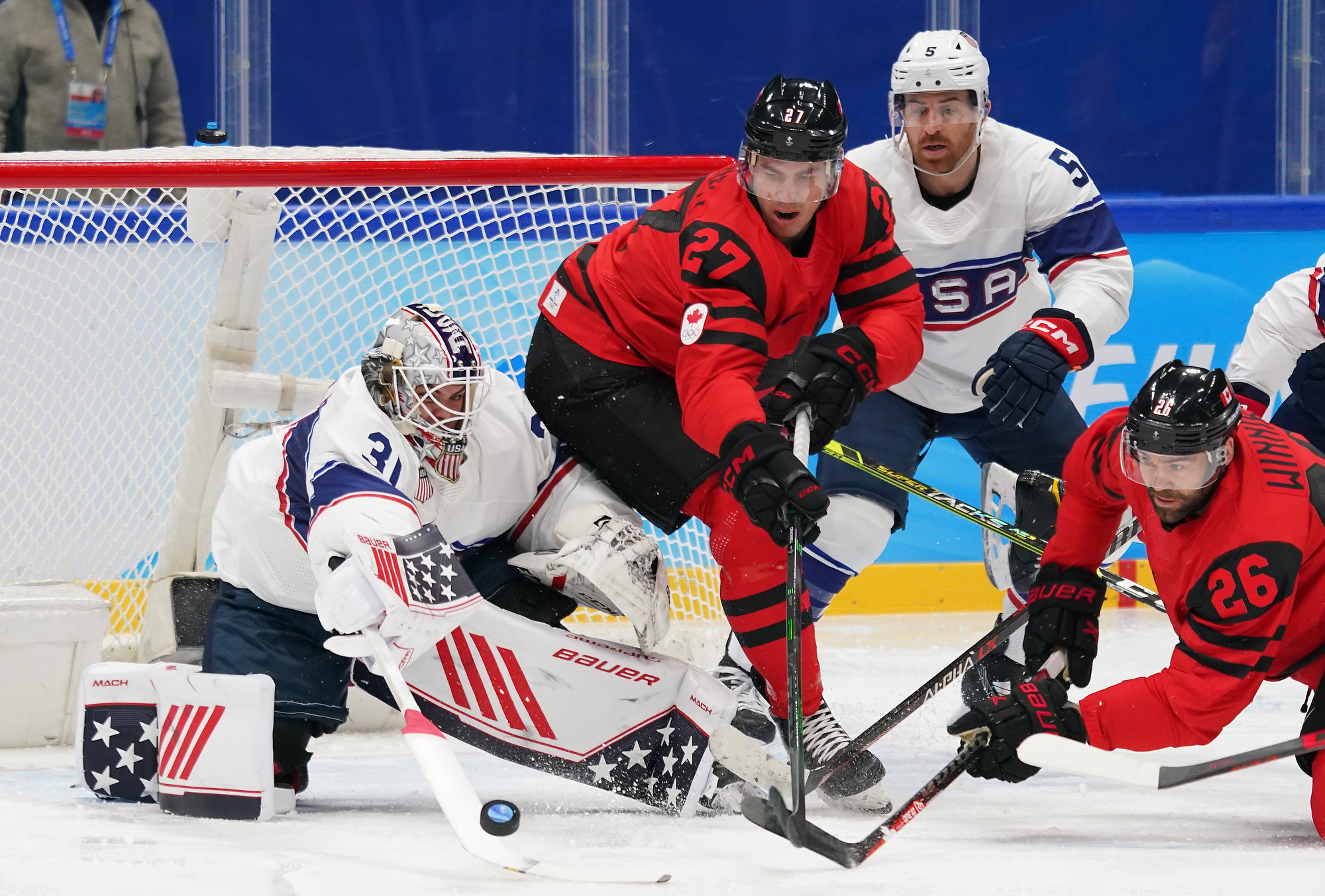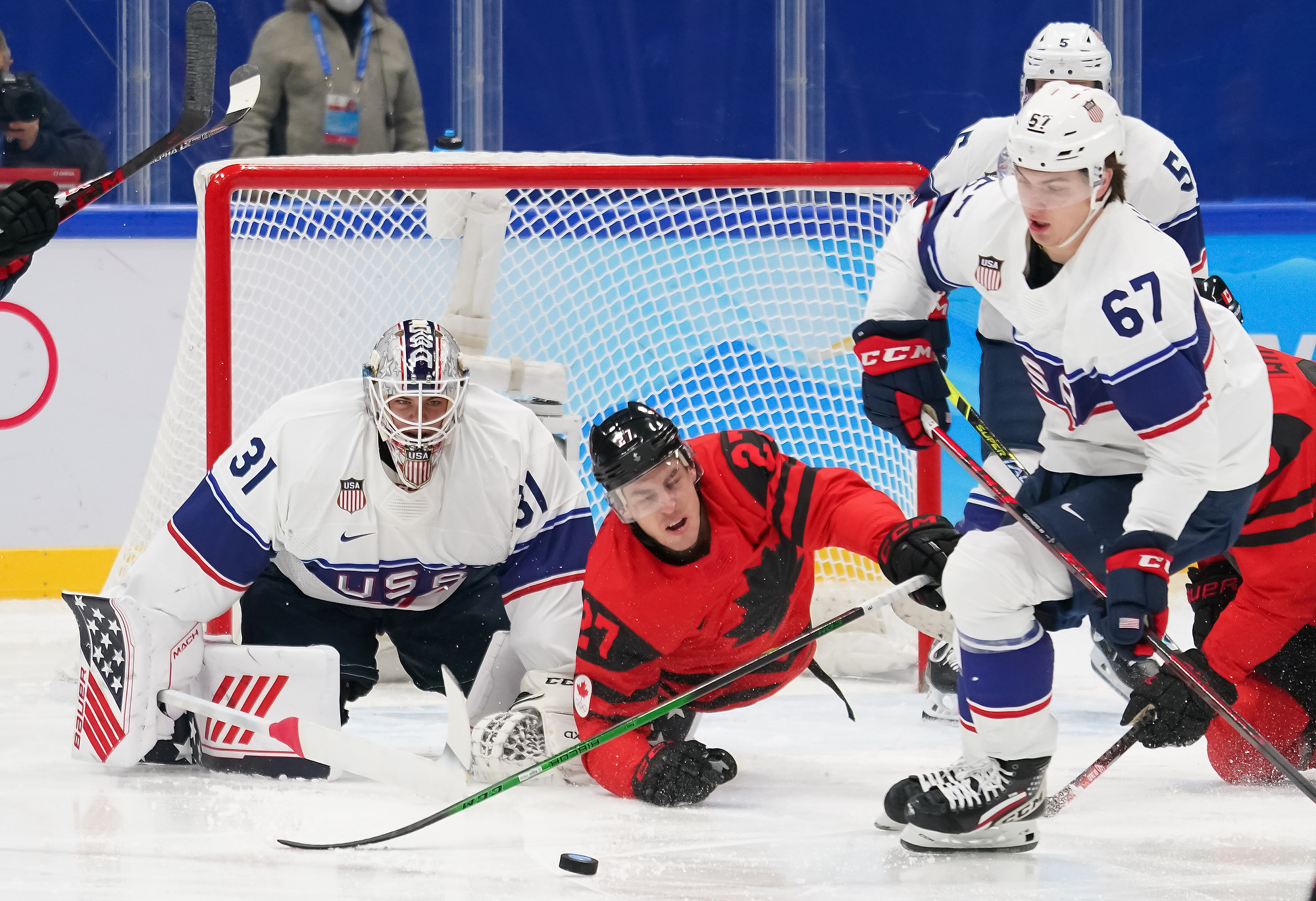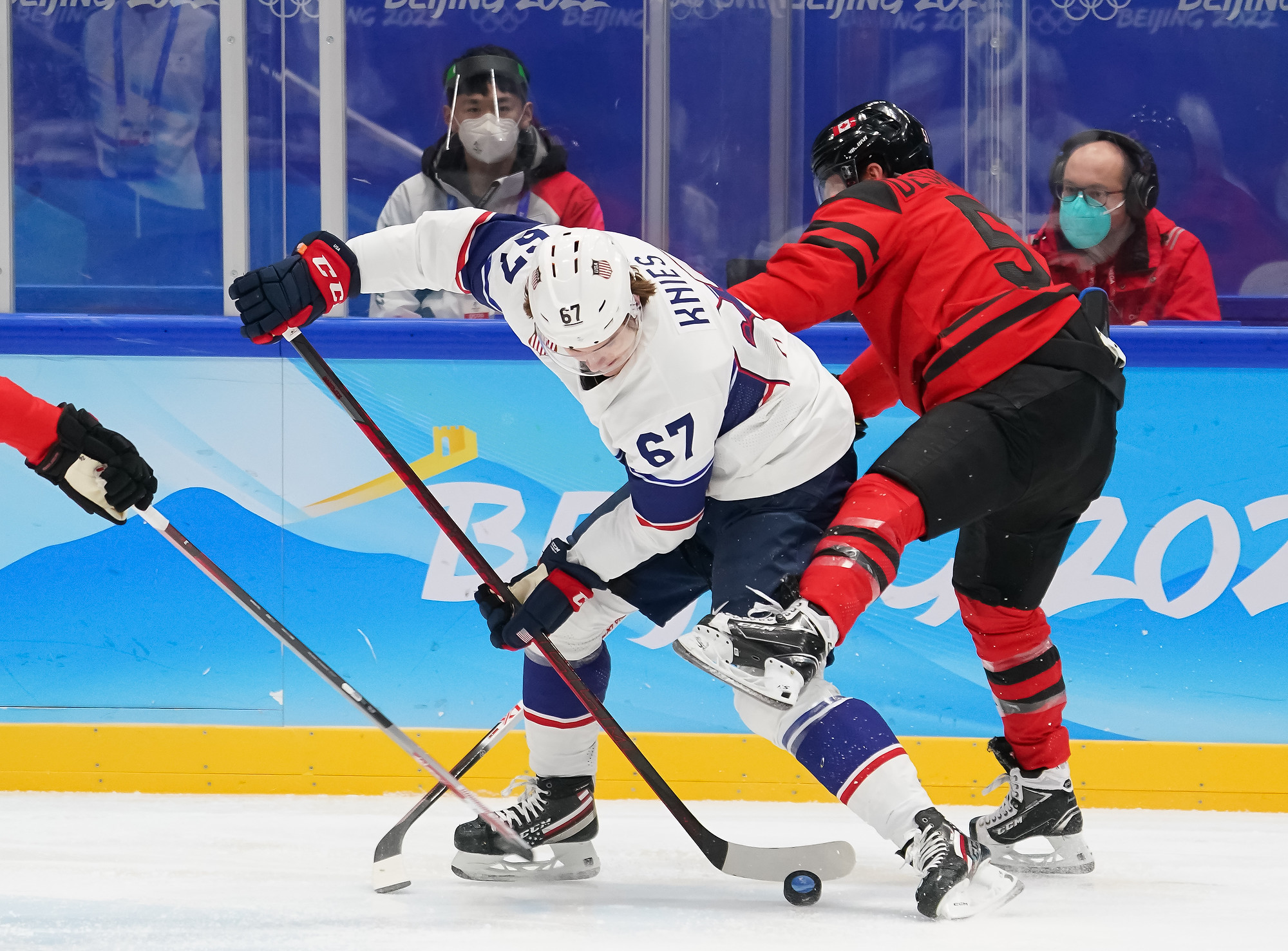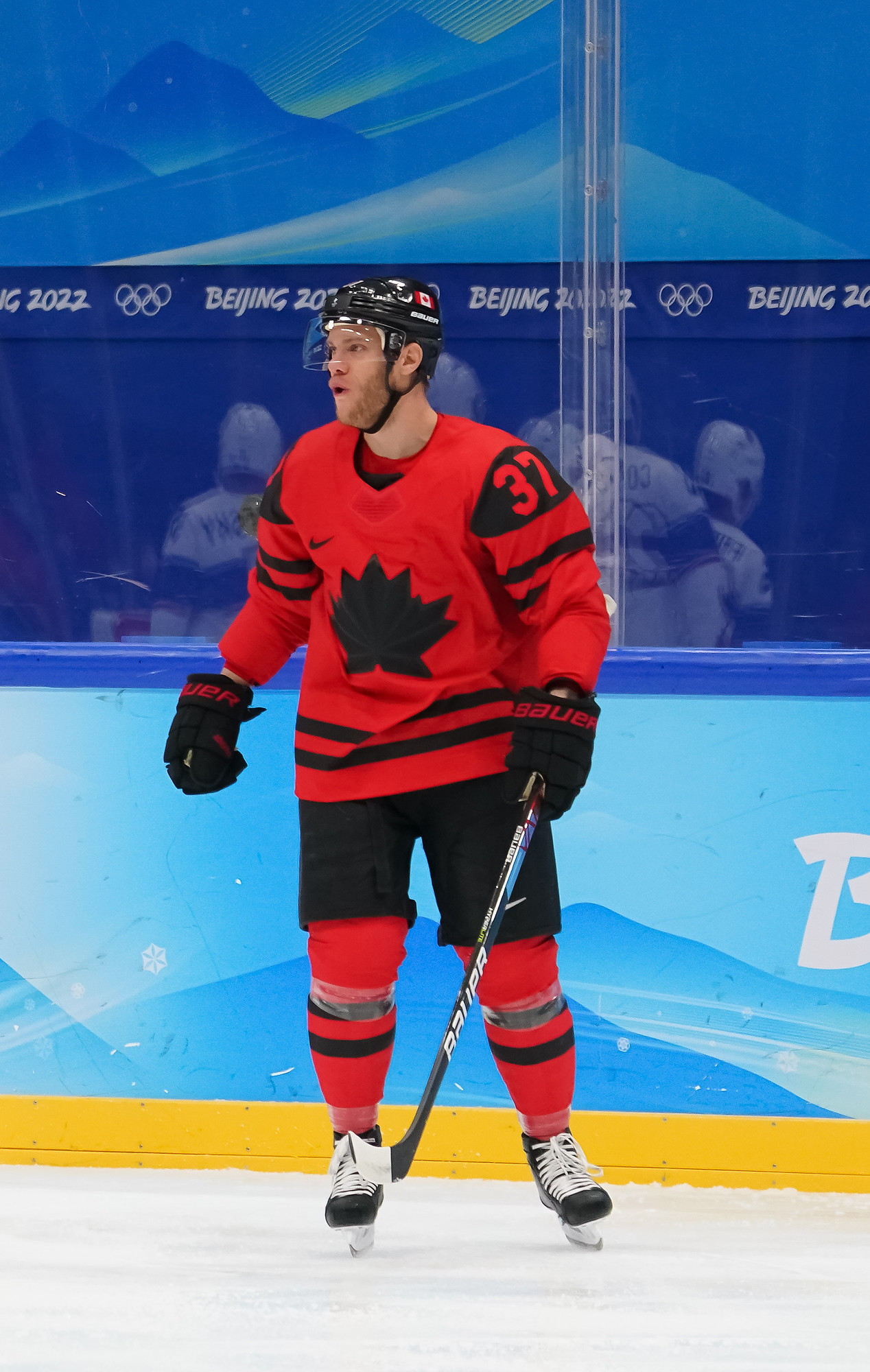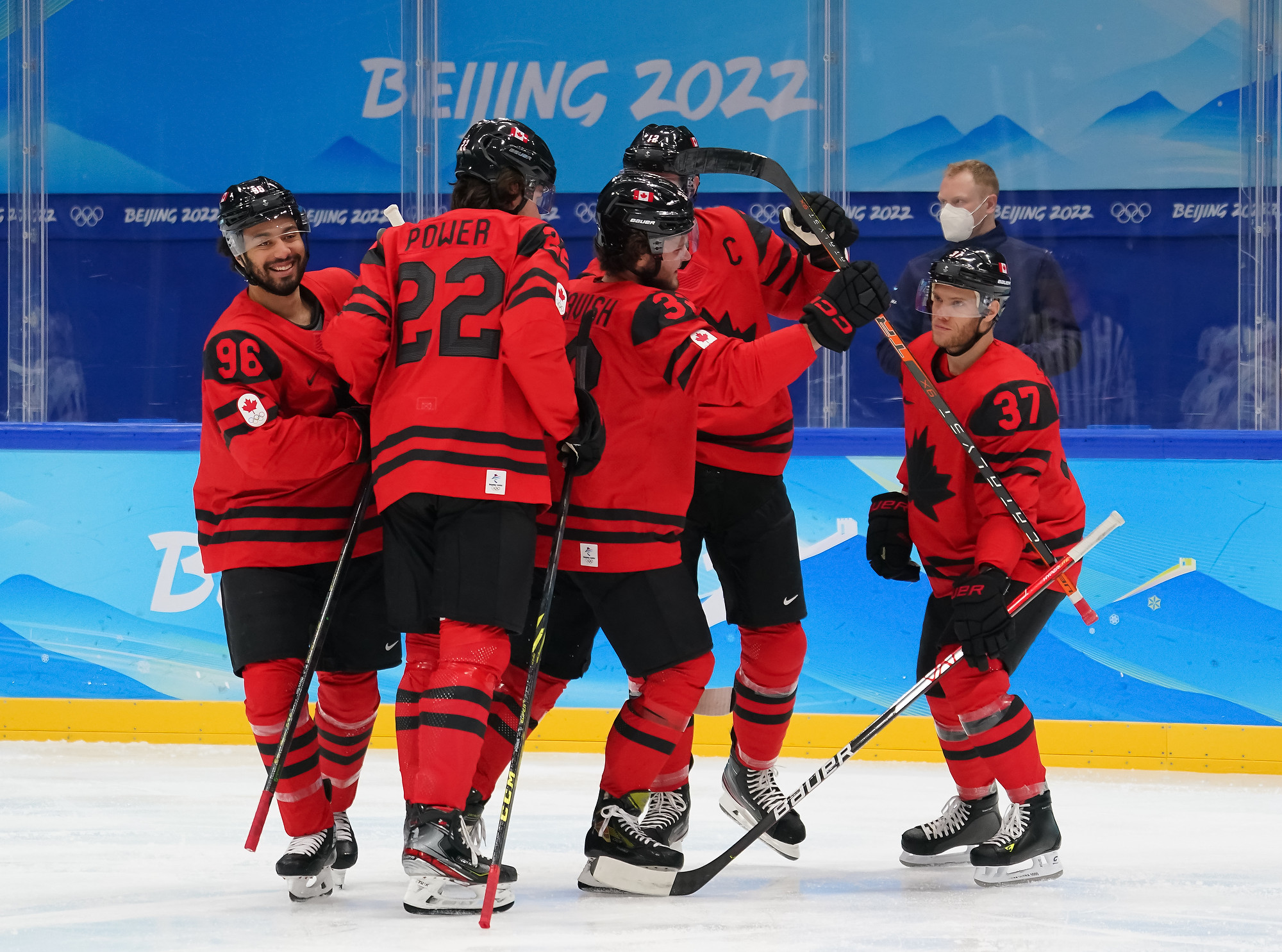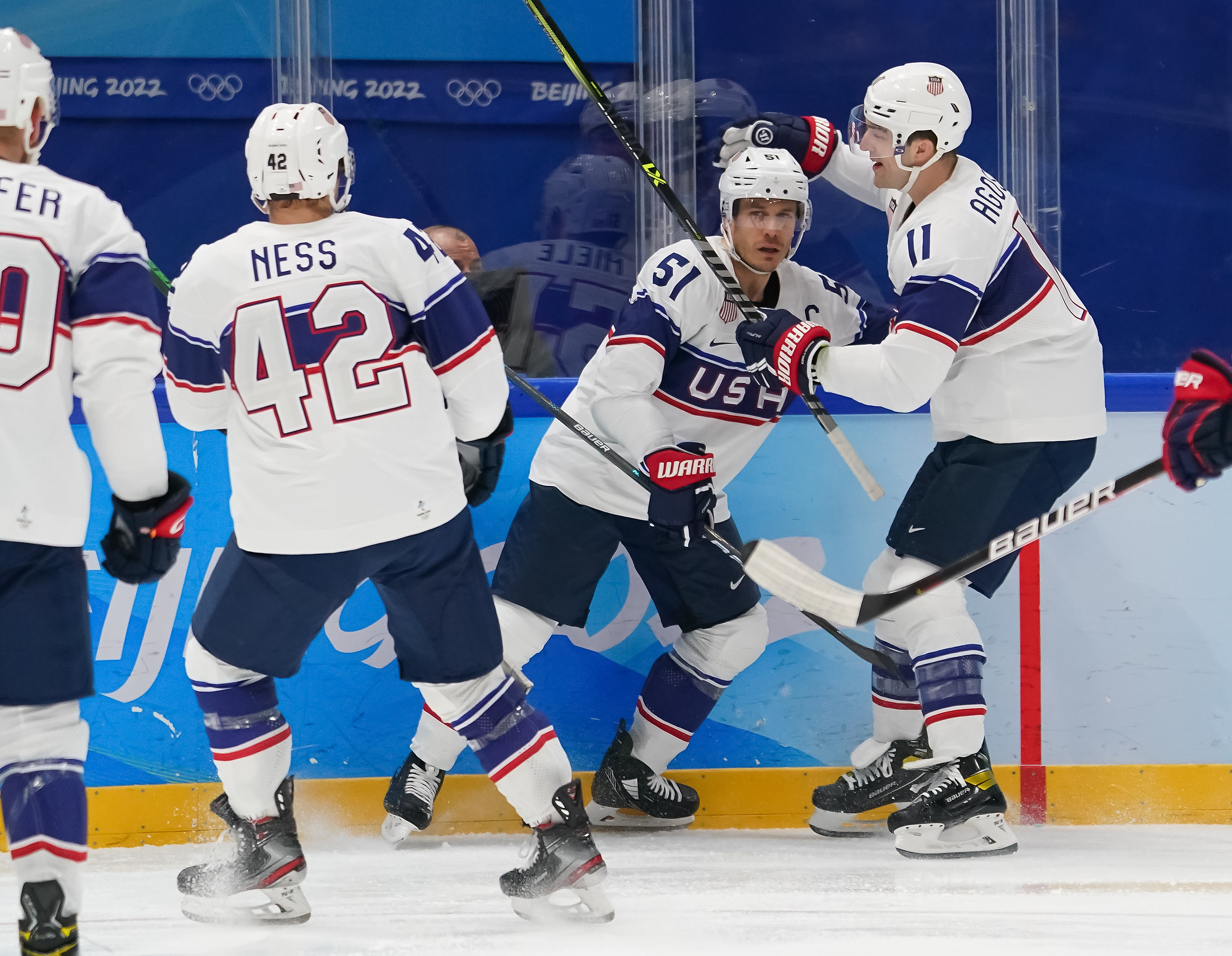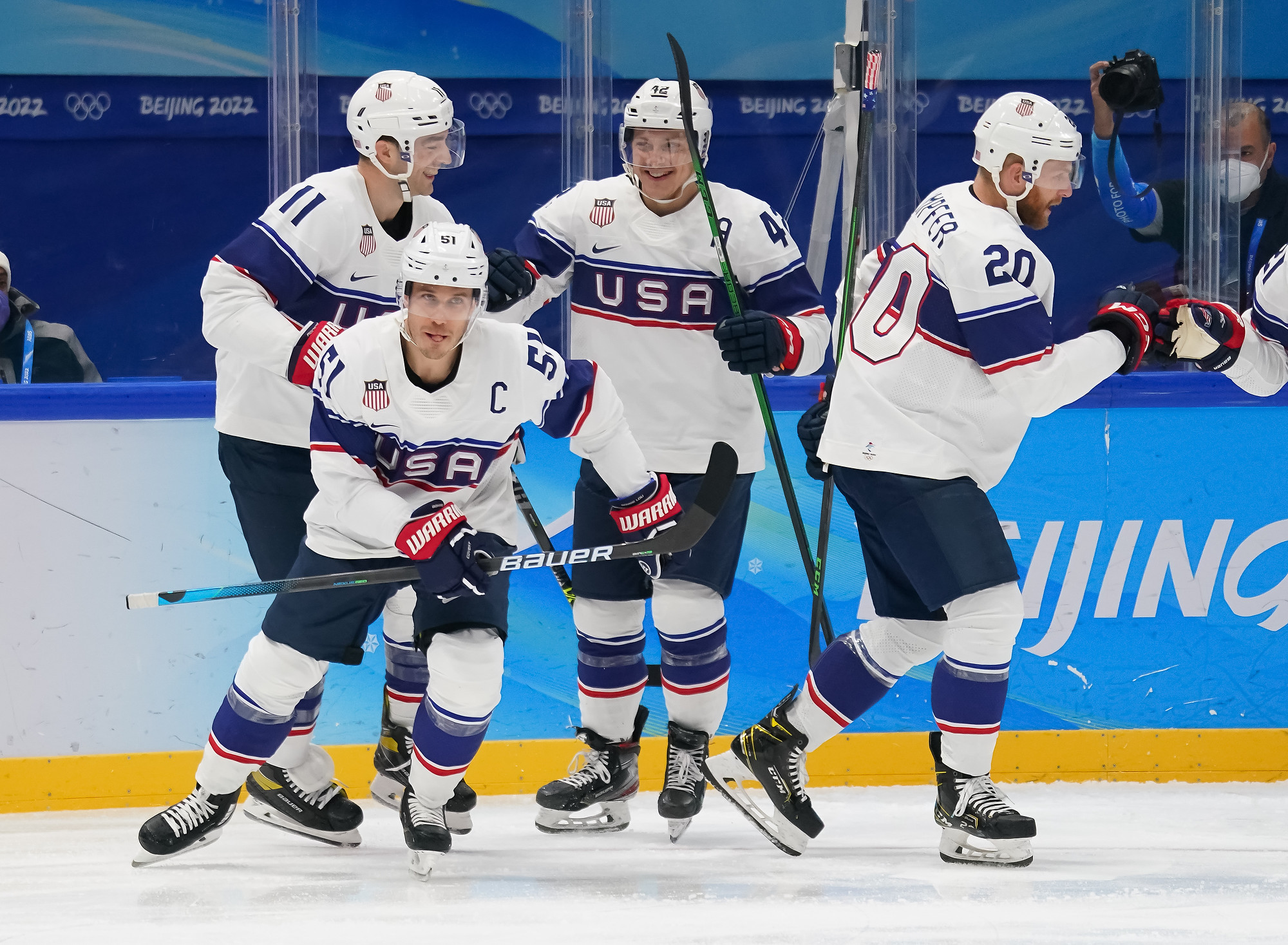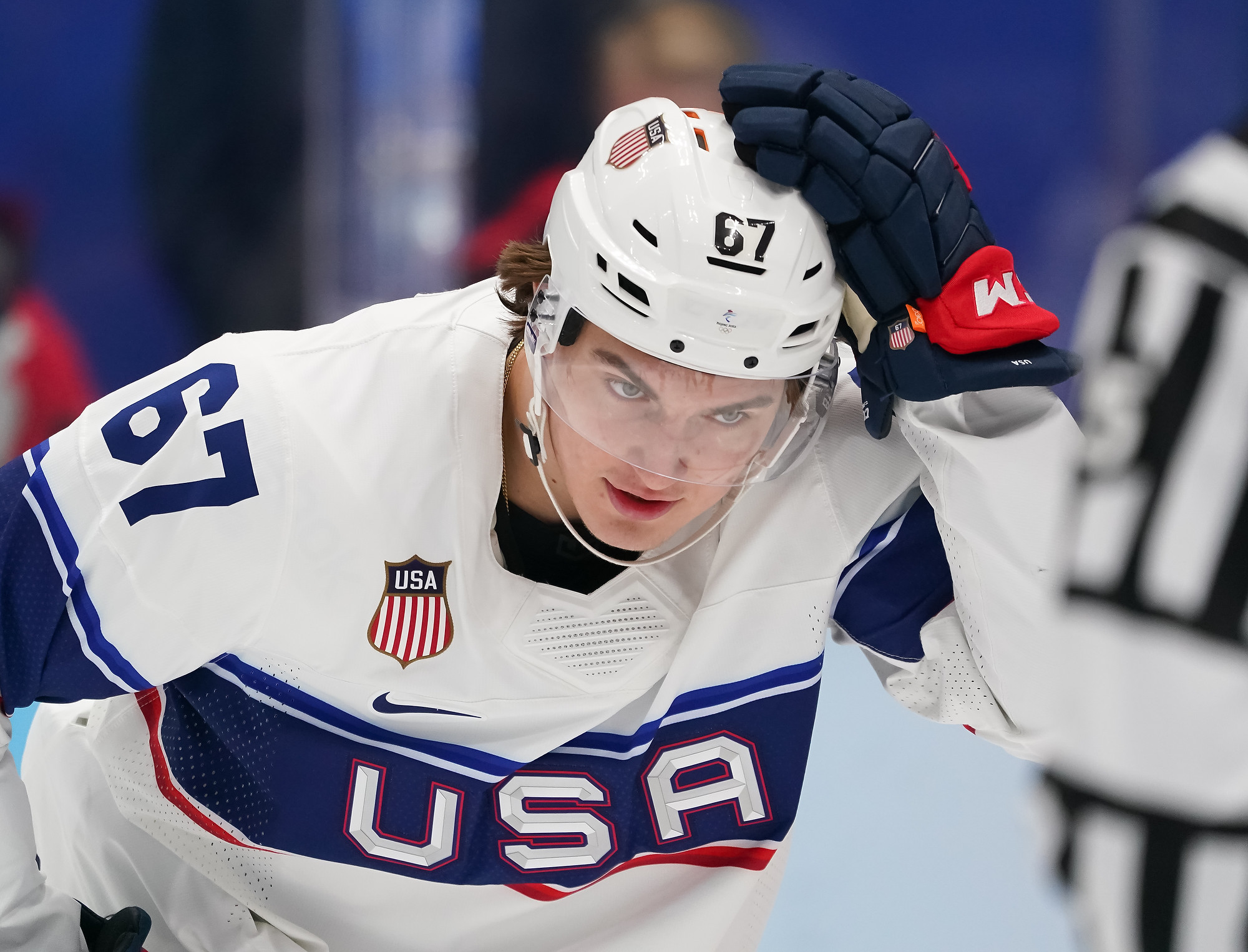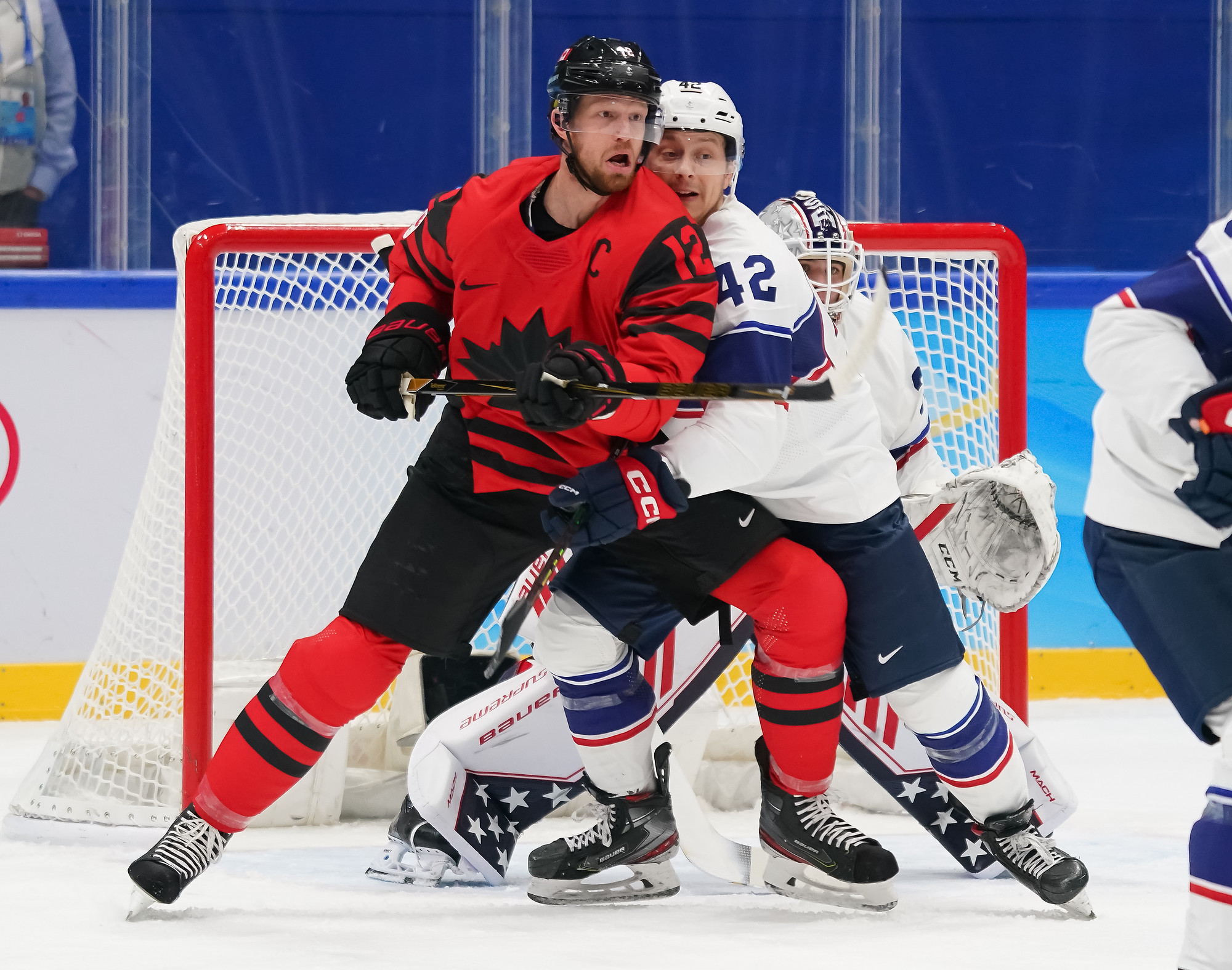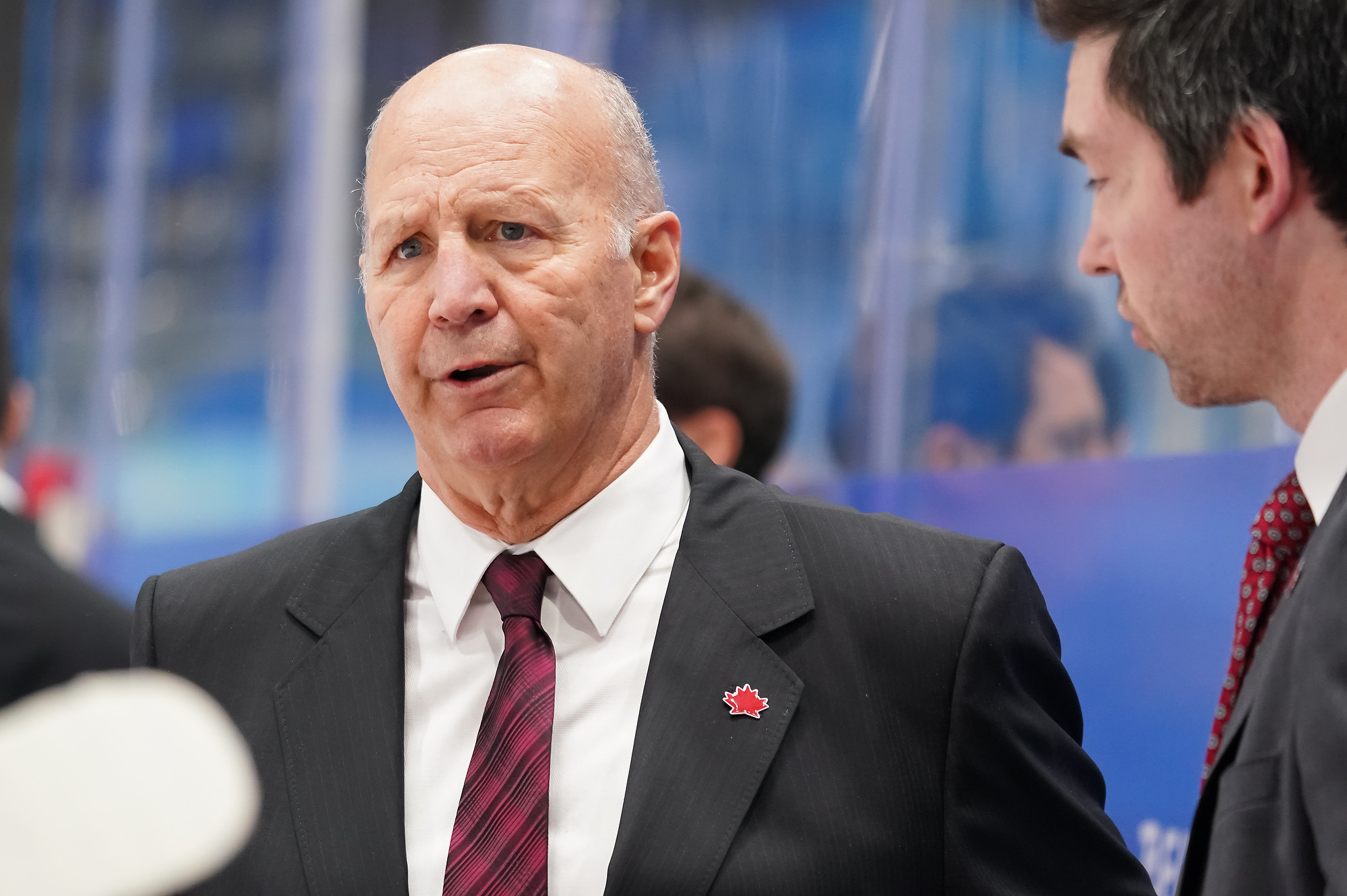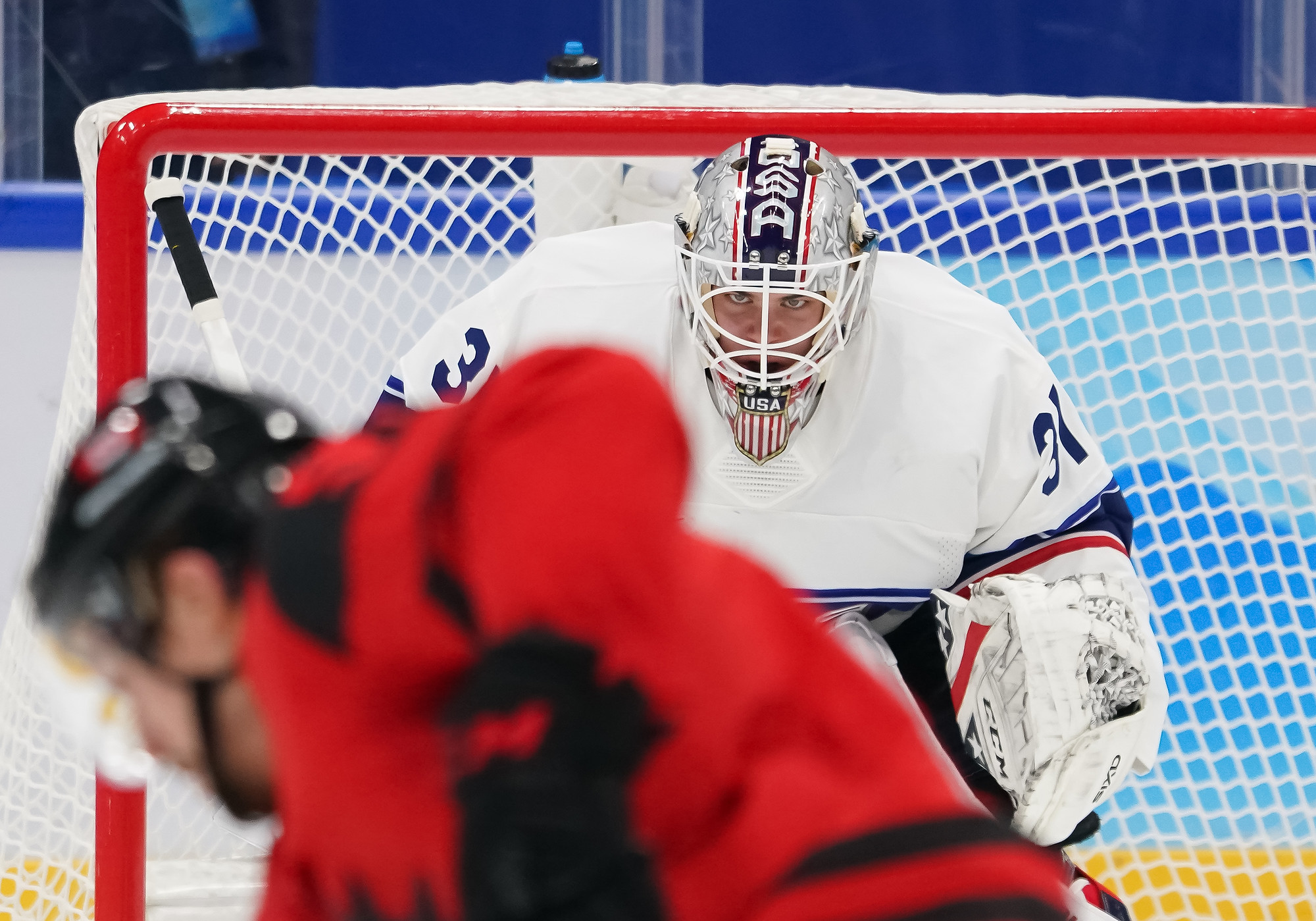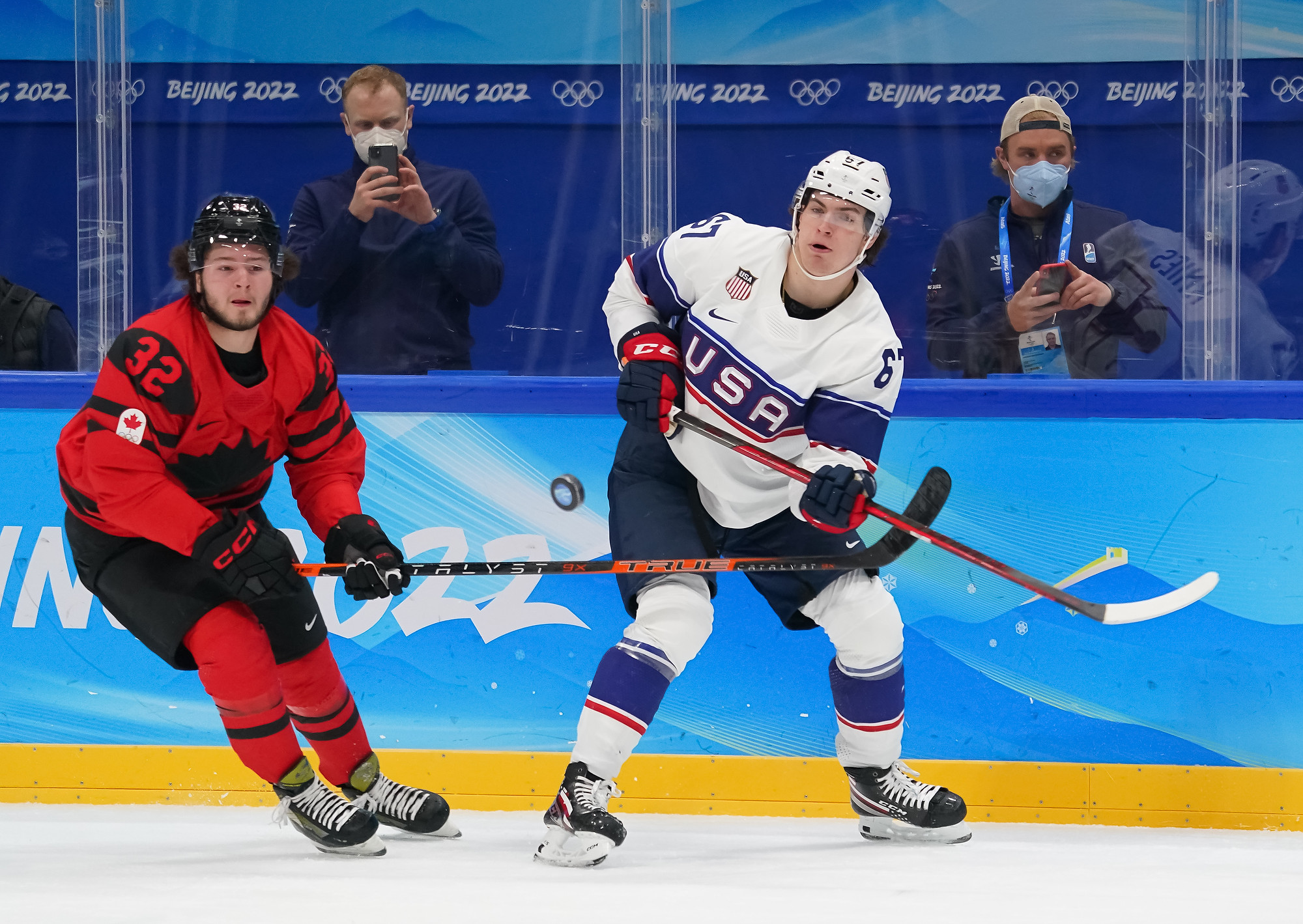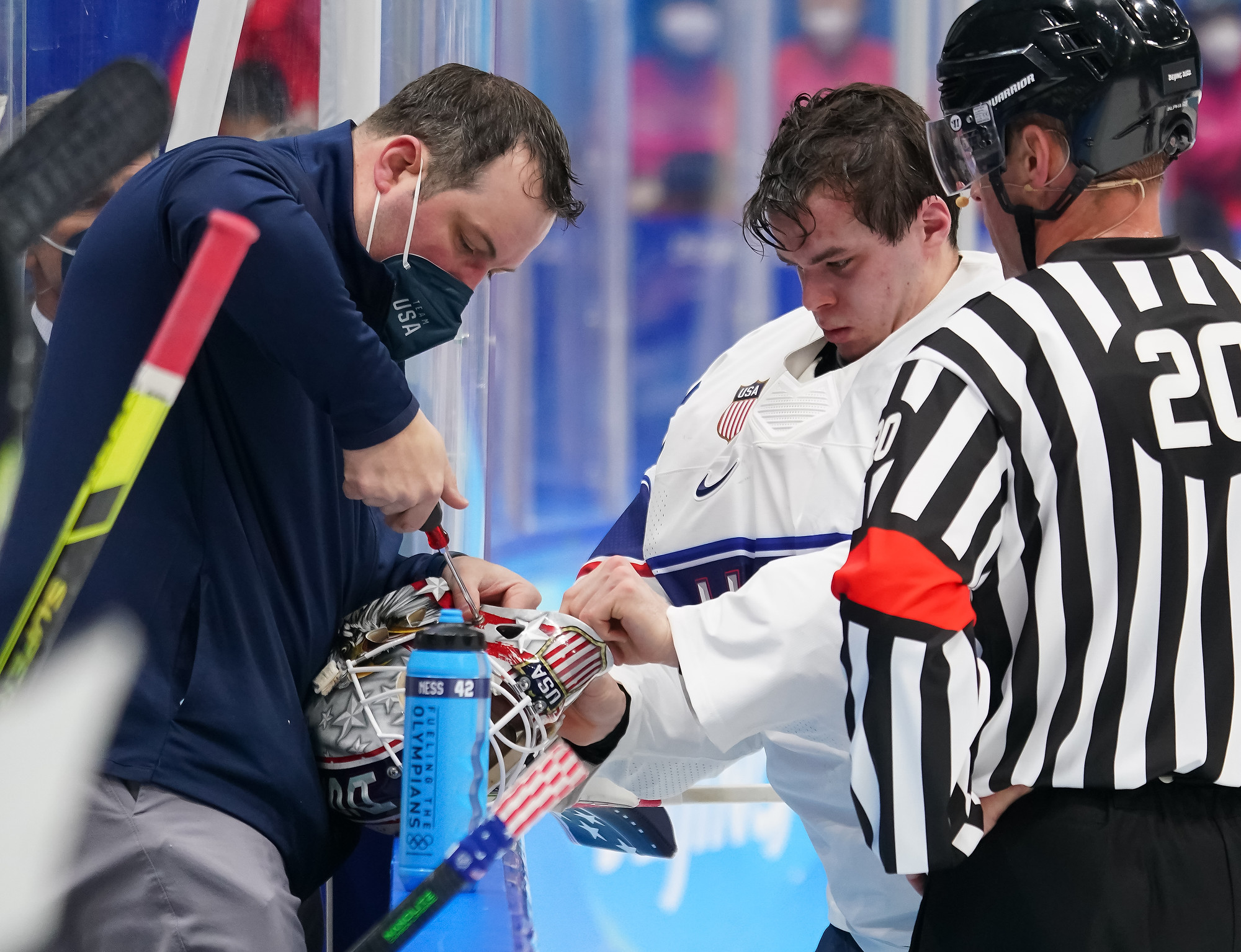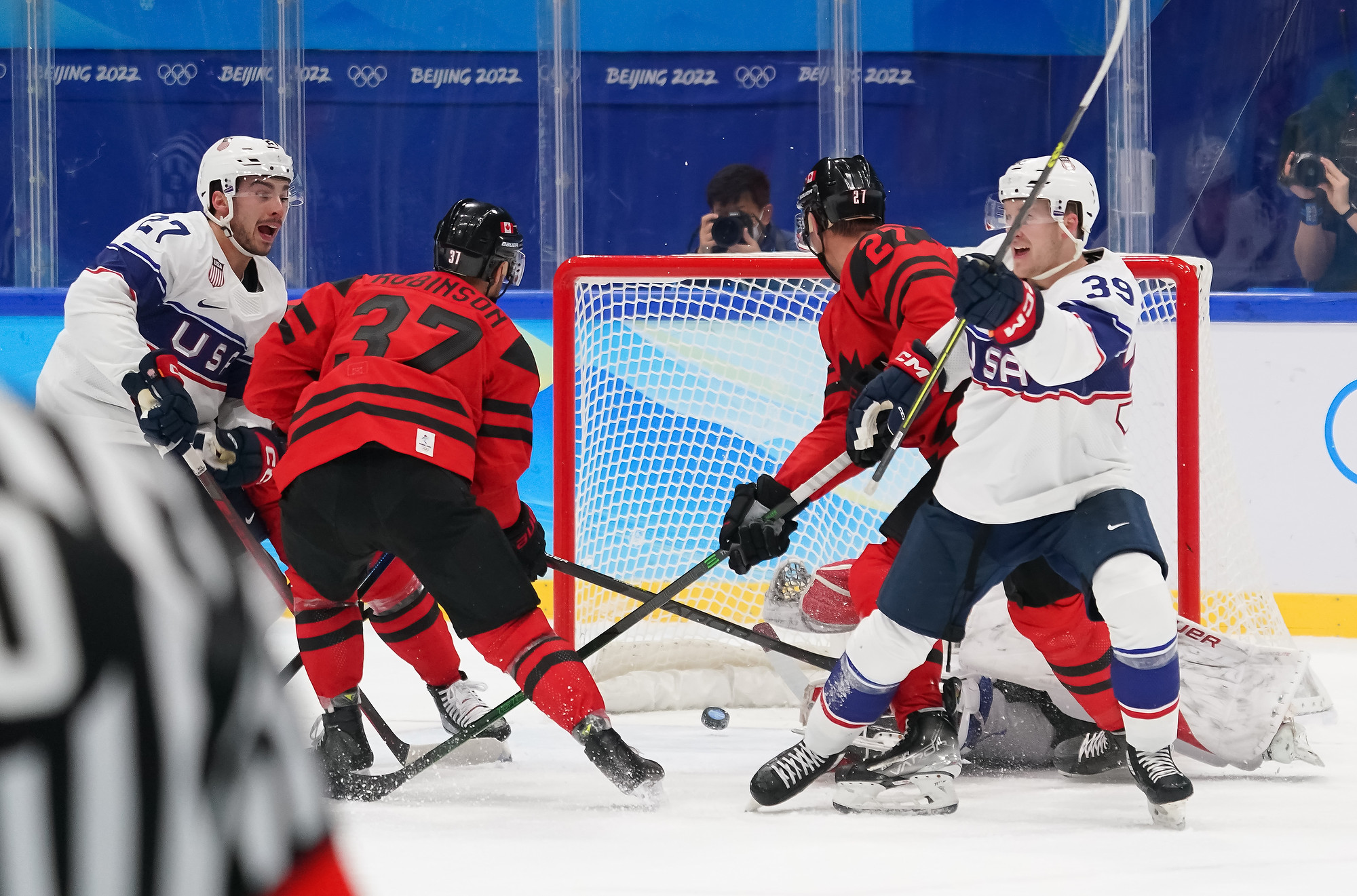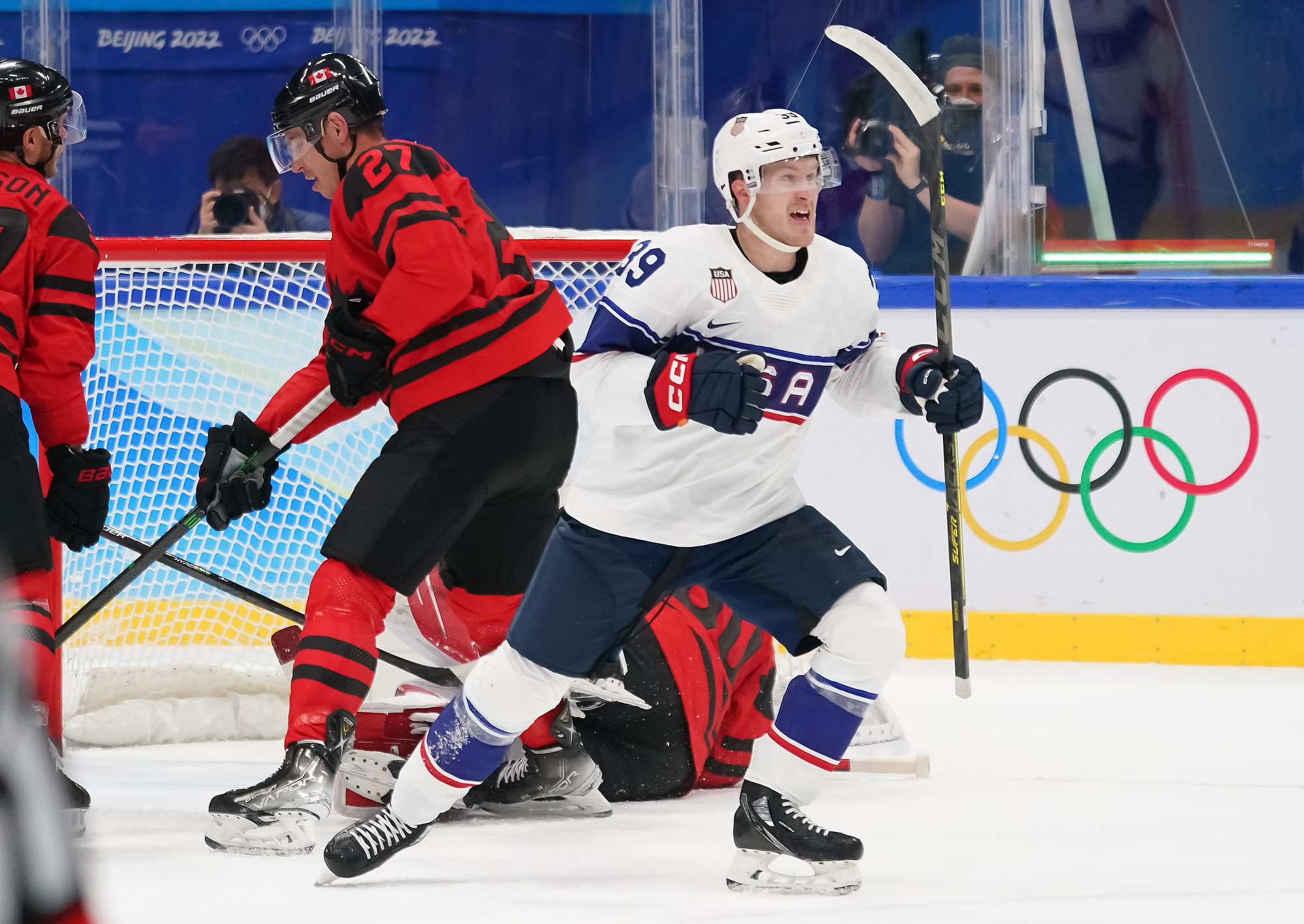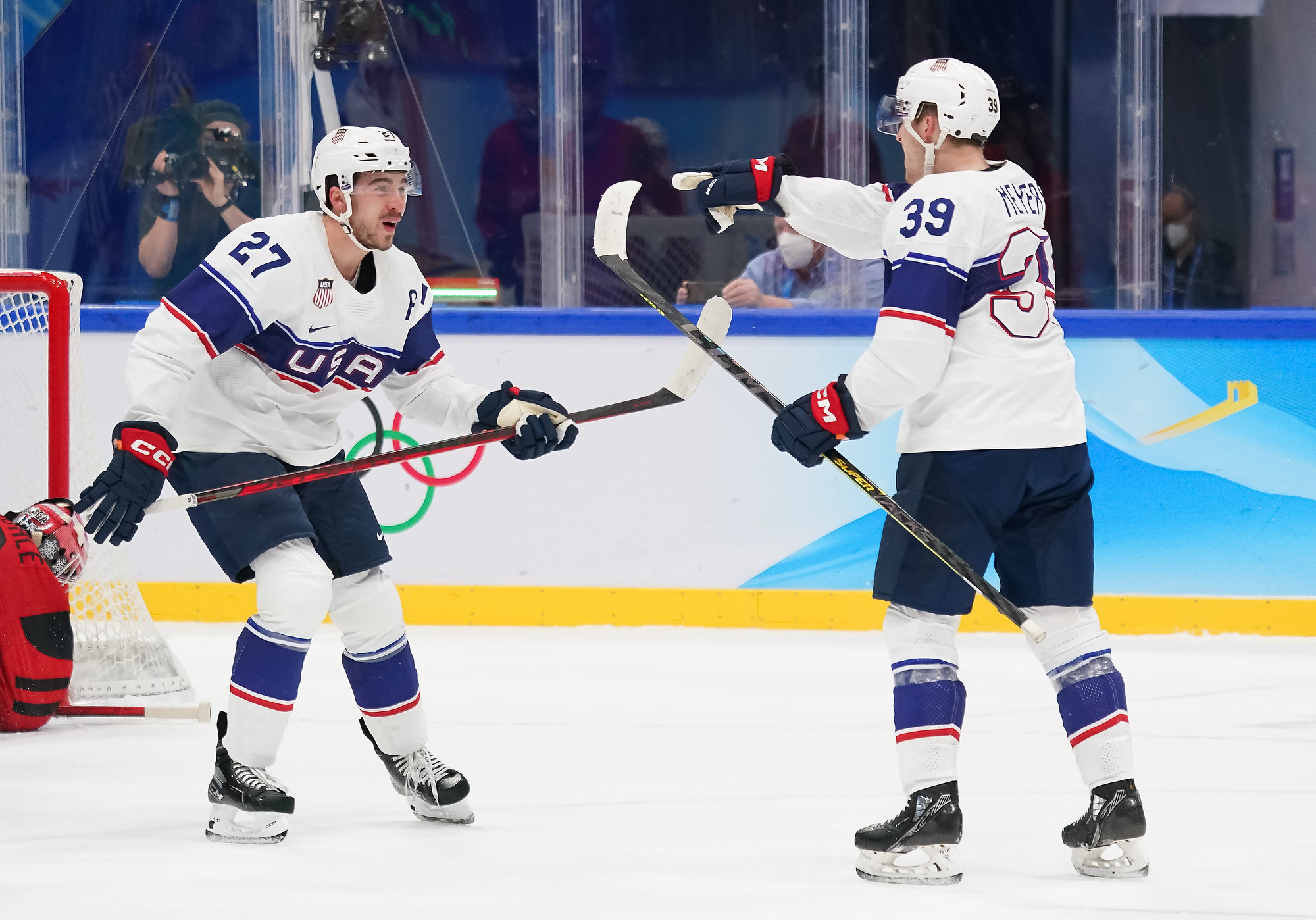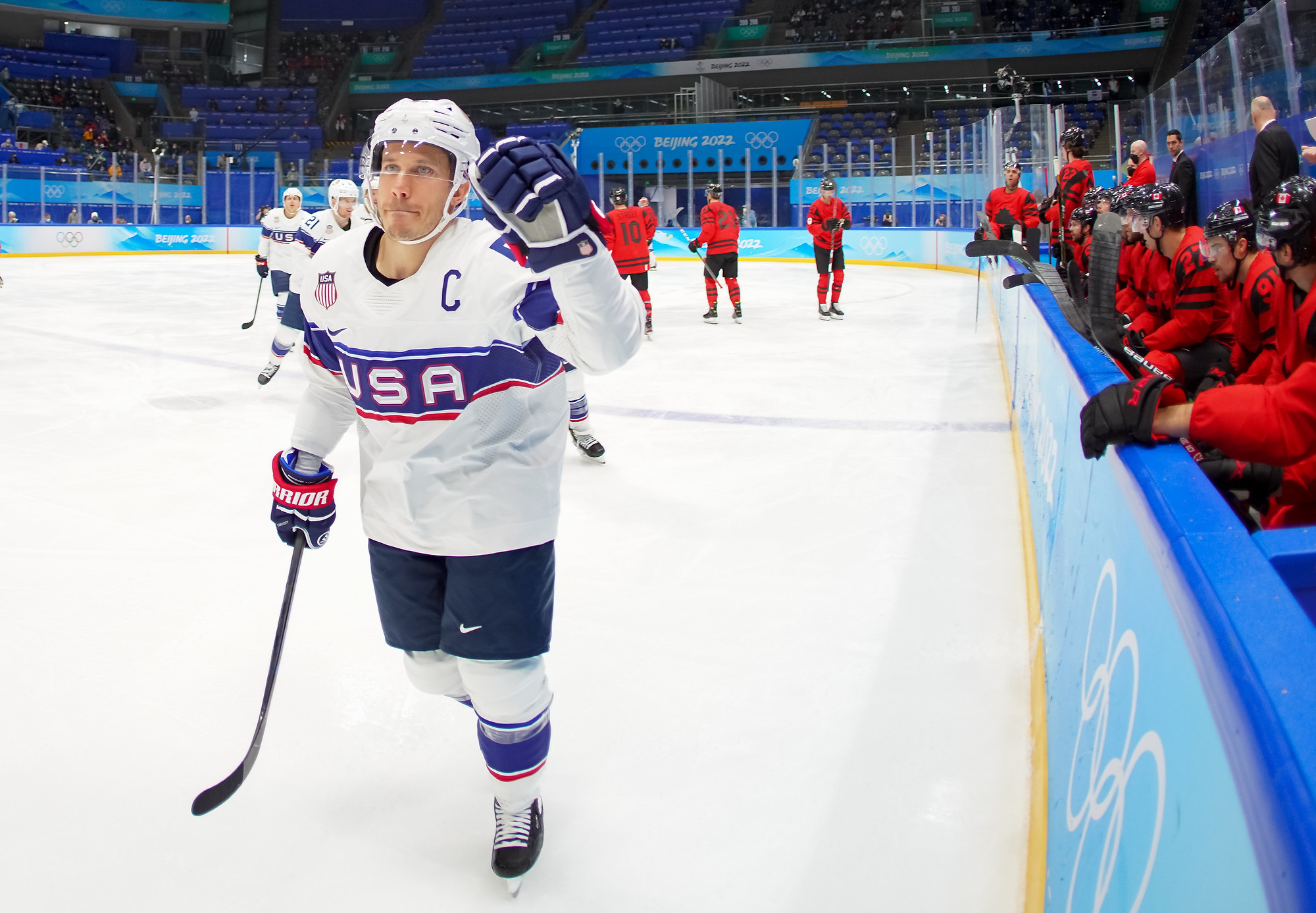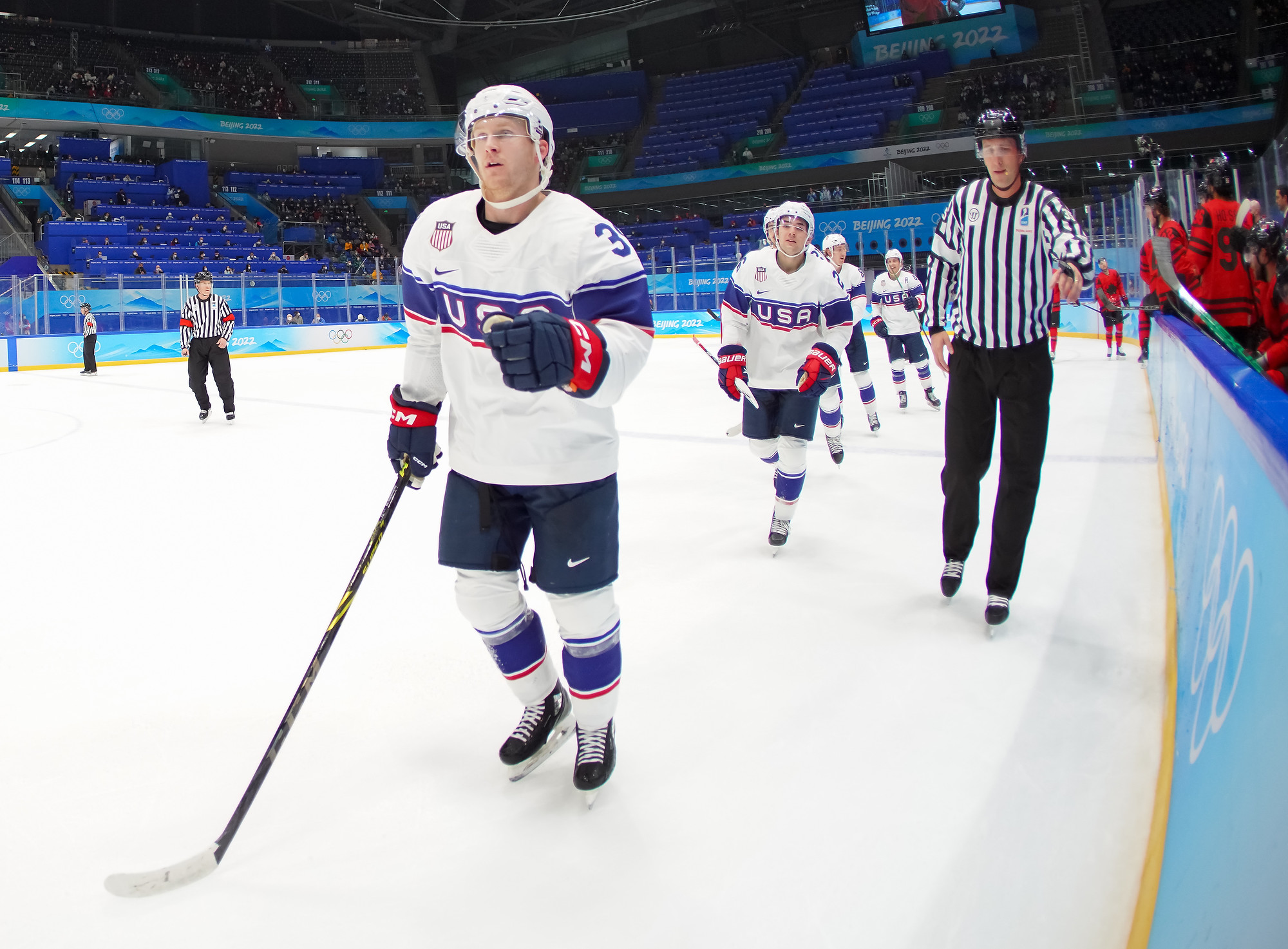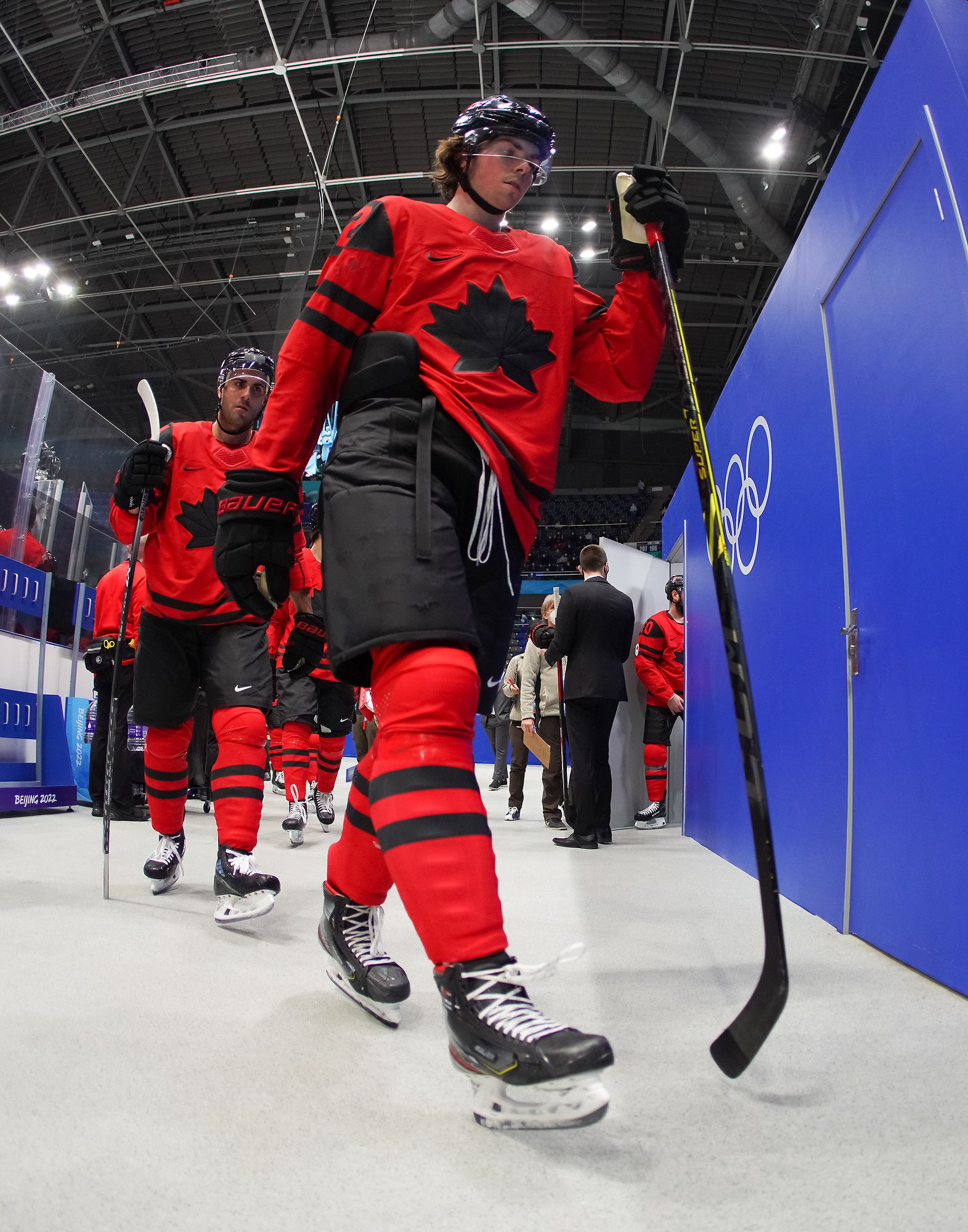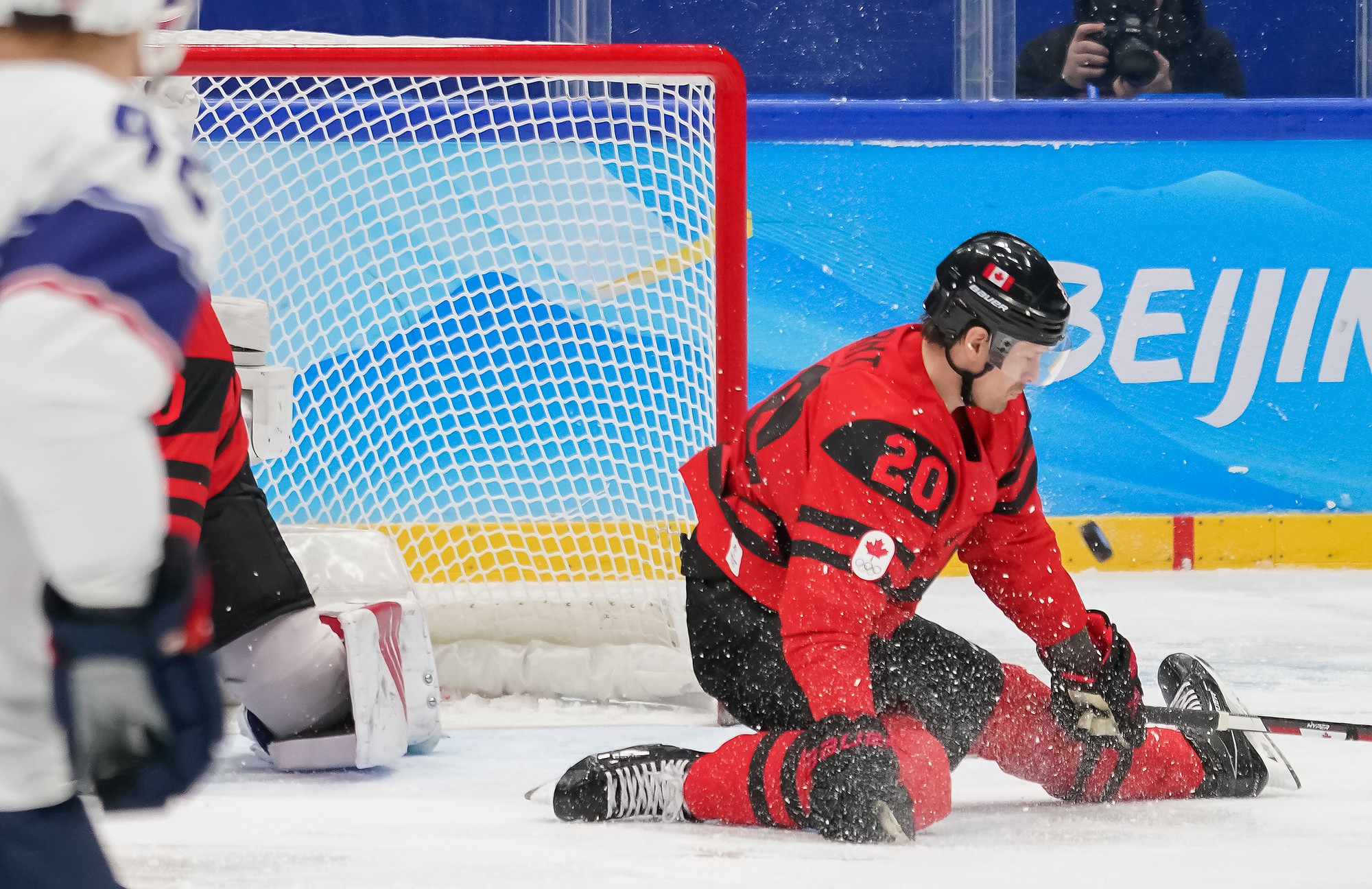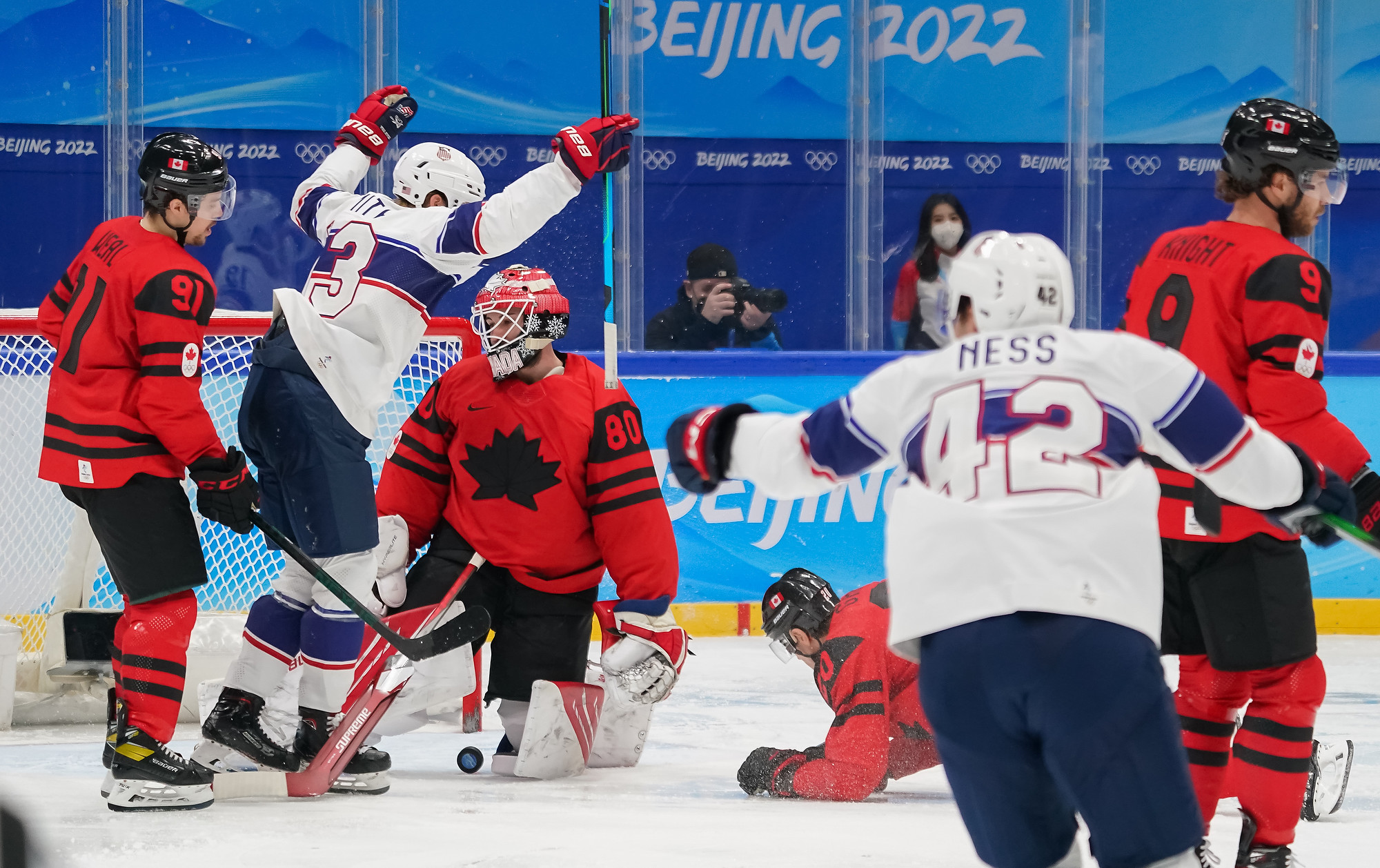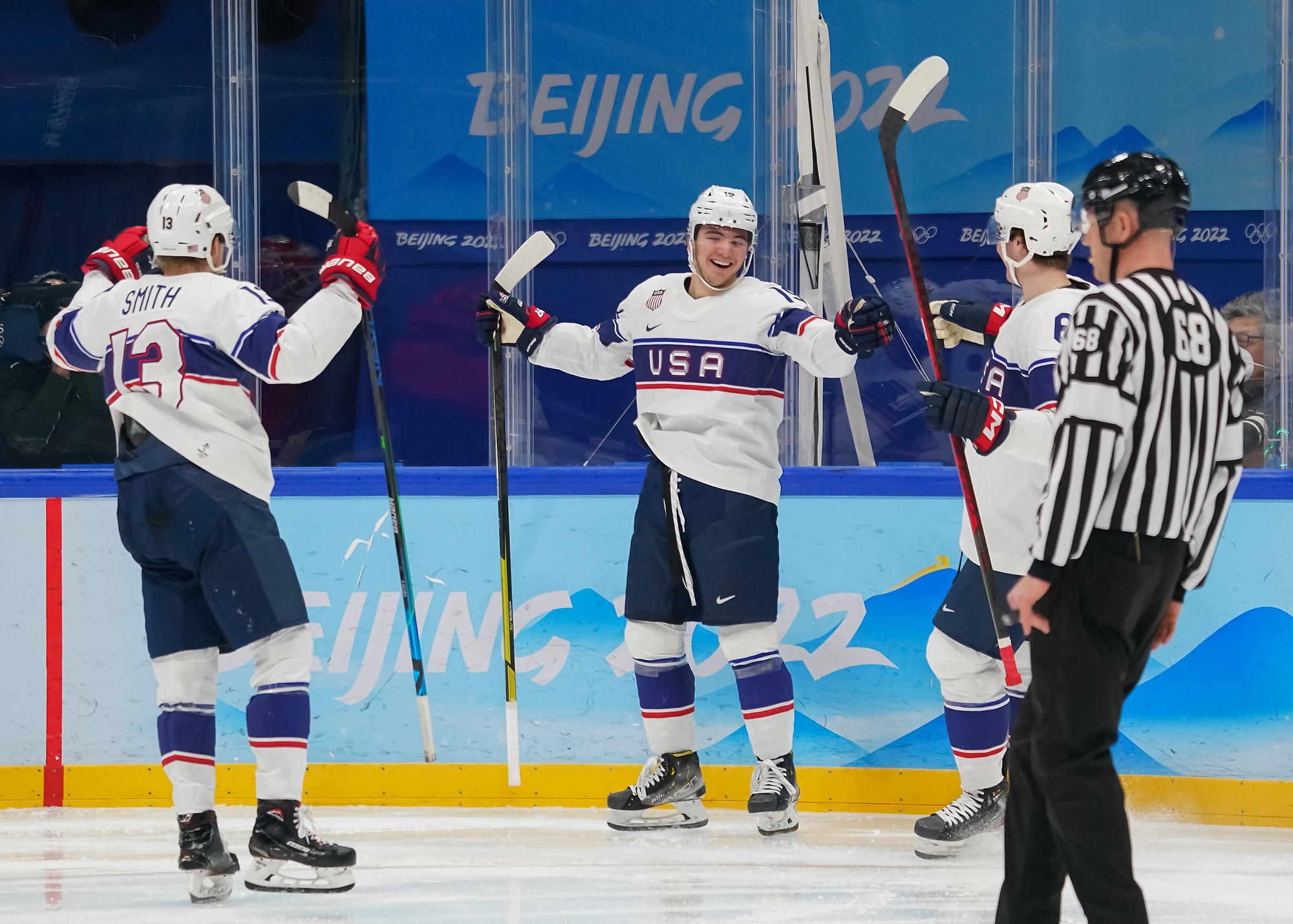U.S. forward Ben Meyers (#39) celebrates after giving his team a 2-1 first-period lead against rival Canada at the 2022 Olympics in Beijing.
photo: Andre Ringuette / HHOF-IIHF Images
More than bragging rights was on the line when the U.S. beat cross-border rival Canada 4-2 at the National Indoor Stadium on Saturday. The U.S.'s second straight win gives it the inside track on first place in Group A in Beijing.
In this high-tempo grudge match laden with momentum swings, Canada outshot the U.S. 37-27. America's skill and opportunism ultimately trumped their opponents' veteran grit. The Canadians never quit, but were unable to come back after trailing 3-1 early in the second period.
"We played really simple," U.S. forward Matt Knies said. "You know, put the pucks in, threw pucks to the net. That was our recipe. We were looking to just match their pace and match their physicality. And I think we did that well and that's why we had so much success."
For the U.S., captain Andy Miele stepped up with a goal and an assist. Ben Meyers, Brendan Brisson, and Kenny Agostino had the other goals.
Matt Robinson and Corban Knight replied for Canada.
"It was competitive," said Canadian captain Eric Staal. "It was close. I would have liked to see a couple of those bounces in the end of the second [period go in] when we had the power play to tie it up, going into the third. But it wasn't meant to be today and now it's about how we respond tomorrow."
Next up on Sunday, Canada takes on China and the U.S. faces Germany as the preliminary round wraps up.
This was a duel between two goalies playing their first Olympic games. U.S. netminder Strauss Mann, currently starring for the SHL’s Skelleftea AIK, outshone Eddie Pasquale, in his second season with the KHL’s Lokomotiv Yaroslavl.
Claude Julien made his debut as Canada’s Olympic head coach. The 61-year-old, who won the Stanley Cup with the Boston Bruins in 2011, had his arrival in Beijing delayed since he injured his ribs and punctured a lung while sledding in Switzerland during a team-building activity.
Doctors cleared Julien to travel and retake the reins from assistant coach Jeremy Colliton, who guided the Canadians to a 5-1 opening win over Germany, the 2018 silver medalists, on Wednesday.
"It was fast," Julien admitted. "It didn’t look good when it first happened, but with good medical care, I was able to recover quickly."
Featuring five 19-year-olds, this is the youngest American Olympic team since 1994. U.S. head coach David Quinn slotted just-arrived 19-year-old defenceman Jake Sanderson into the lineup. Sanderson earned an assist in his debut. The smooth-skating fifth overall pick of the Ottawa Senators in 2020 won gold at the 2021 World Juniors and captained the 2022 World Junior team in Edmonton.
Agostino praised Sanderson: "Getting on the board after traveling for 36 hours and jumping into an Olympic hockey game against Team Canada says a lot about him, not only as a player, but as a person, in terms of his maturity, to be able to handle that situation. It's pretty obvious how talented and mature he looks out there."
The Americans succeeded in building on their opening 8-0 victory over host China. They’re seeking their first Olympic gold medal since the 1980 “Miracle on Ice” in Lake Placid. They’ve won two silver medals since then on North American ice (Salt Lake City 2002, Vancouver 2010).
"We're going to keep the energy high," Miele said. "We've got young legs, so they can buzz all game long. We've got to let them do that. "
"Ready for a Miracle on Ice?" said Mann. "I definitely grew up watching that. I think all the guys did. We've got a lot of college guys. I don't know if it's the same. We've got a chance, though. It's just about building every game and getting a little bit better every game, staying in the present moment and not getting too far ahead of ourselves."
It took just 1:24 for Canada to get on the board. Robinson, one of three returning 2018 bronze medalists on this squad, slid a shot from the side boards that slipped through a kneeling Mann’s pads.
Moments later, Mann got some redemption with an excellent stop from the slot on Kent Johnson, a 2022 World Junior participant drafted fifth overall by Columbus in 2021.
The Americans struck back with the equalizer at 2:34. Miele swooped in over the blue line and the shifty 33-year-old Torpedo Nizhny Novgorod centre, who won the 2011 Hobey Baker Award with Miami, knifed a vicious backhand over Pasquale’s glove.
"To put a stop to their momentum right away like that was awesome," Miele said.
"We knew that they were going to be quick on pucks," Staal said. "I think with some of the decision-making, we could have maybe executed a little bit better at times, be a little more physical. But they were quick and honest."
Late in the period, both goalies faced mounting pressure. Mann had to go for repairs on his mask, and Pasquale made a stellar right pad save when Nick Abruzzese pivoted atop his crease and tried to stuff it in.
The Canadian netminder wasn’t so fortunate when Meyers swatted in a loose puck in a goalmouth scramble for a 2-1 U.S. lead at 18:44. Sanderson earned his first Olympic point with an assist.
Early in the second period, Pasquale went behind the net to handle the puck and turned it over. Nick Shore opportunistically centred it to Brisson, who backhanded it high past the scrambling goalie and exulted as the U.S. went up 3-1 at 2:37. As with Meyers, it was the second goal of these Olympics for Brisson.
"We had a really good pushback and that led to all those goals," Knies said.
Julien’s team didn’t wilt, but struggled to score. Defenceman Maxim Noreau, Canada’s leading scorer with seven points at the 2018 Olympics, rang a high one off Mann’s short-side post. Staal, a Triple Gold Club member since Vancouver 2010, cut in off left wing but couldn’t fool Mann with a quick release.
Things got chippier. When U.S. veteran Brian O'Neill tried to power to the net, defenceman Alex Grant buried him right into Pasquale, whose helmet popped off.
Knight, who ranks third in KHL scoring with 48 points for Avangard Omsk, cut the deficit to 3-2 at 14:13 on a shorthanded 2-on-1. Taking Daniel Winnik's wobbly cross-ice pass on the right, Knight outwitted Mann with a laser release that flew past the goalie's blocker. It was the first Olympic goal for the 31-year-old Winter Games rookie from Oliver, British Columbia.
Canada was all over the Americans on a power play in the dying moments of the second, and the best chance went to Noreau, who once again dinged one off the iron.
"We're blocking shots, competing," said Mann. "It felt like there's a lot of zone time for both teams, which can be hard for the D, the goalies, the forwards. Your lines start burning and key in that situation is to just stay with it and keep competing and I thought our guys did a really good job of that."
Tenacious American checking at both ends paid off in the third period. Miele stole the puck inside the Canadian blue line and dropped it to Agostino, whose long, heavy slapper squeezed through Pasquale for a 4-2 U.S. lead at 6:13.
The Canadians kept coming. They had a golden opportunity with a two-man advantage for 31 seconds with under five minutes, but Mann rose to the occasion along with the U.S. penalty-killers. Canada's Mason McTavish put yet another shot off Mann's post before the power play expired. This just wasn't Canada's night.
"The second half of the first period, the first half of the second period, we were definitely the better team," Julien said. "And when we started playing, we definitely evened the playing field and even actually had a chance to be the better team at that point. But hockey is hockey."
"It's a pretty surreal stage, obviously a huge rivalry in hockey," Knies said. "To be on the winning side of it is definitely a good moment and it's something I'm never going to forget."
It was the first Winter Games clash between the North American rivals since Jamie Benn’s second-period goal gave Canada a 1-0 win over the U.S. in the 2014 semi-finals in Sochi. The last time the U.S. beat Canada in Olympic competition was a 5-3 round-robin win on 21 February 2010 in Vancouver, where Jamie Langenbrunner tallied the eventual winner.
The Canadians have won three out of the five Olympics featuring full NHL participation (2002, 2010, 2014), but haven’t captured gold sans NHLers since 1952.
In this high-tempo grudge match laden with momentum swings, Canada outshot the U.S. 37-27. America's skill and opportunism ultimately trumped their opponents' veteran grit. The Canadians never quit, but were unable to come back after trailing 3-1 early in the second period.
"We played really simple," U.S. forward Matt Knies said. "You know, put the pucks in, threw pucks to the net. That was our recipe. We were looking to just match their pace and match their physicality. And I think we did that well and that's why we had so much success."
For the U.S., captain Andy Miele stepped up with a goal and an assist. Ben Meyers, Brendan Brisson, and Kenny Agostino had the other goals.
Matt Robinson and Corban Knight replied for Canada.
"It was competitive," said Canadian captain Eric Staal. "It was close. I would have liked to see a couple of those bounces in the end of the second [period go in] when we had the power play to tie it up, going into the third. But it wasn't meant to be today and now it's about how we respond tomorrow."
Next up on Sunday, Canada takes on China and the U.S. faces Germany as the preliminary round wraps up.
This was a duel between two goalies playing their first Olympic games. U.S. netminder Strauss Mann, currently starring for the SHL’s Skelleftea AIK, outshone Eddie Pasquale, in his second season with the KHL’s Lokomotiv Yaroslavl.
Claude Julien made his debut as Canada’s Olympic head coach. The 61-year-old, who won the Stanley Cup with the Boston Bruins in 2011, had his arrival in Beijing delayed since he injured his ribs and punctured a lung while sledding in Switzerland during a team-building activity.
Doctors cleared Julien to travel and retake the reins from assistant coach Jeremy Colliton, who guided the Canadians to a 5-1 opening win over Germany, the 2018 silver medalists, on Wednesday.
"It was fast," Julien admitted. "It didn’t look good when it first happened, but with good medical care, I was able to recover quickly."
Featuring five 19-year-olds, this is the youngest American Olympic team since 1994. U.S. head coach David Quinn slotted just-arrived 19-year-old defenceman Jake Sanderson into the lineup. Sanderson earned an assist in his debut. The smooth-skating fifth overall pick of the Ottawa Senators in 2020 won gold at the 2021 World Juniors and captained the 2022 World Junior team in Edmonton.
Agostino praised Sanderson: "Getting on the board after traveling for 36 hours and jumping into an Olympic hockey game against Team Canada says a lot about him, not only as a player, but as a person, in terms of his maturity, to be able to handle that situation. It's pretty obvious how talented and mature he looks out there."
The Americans succeeded in building on their opening 8-0 victory over host China. They’re seeking their first Olympic gold medal since the 1980 “Miracle on Ice” in Lake Placid. They’ve won two silver medals since then on North American ice (Salt Lake City 2002, Vancouver 2010).
"We're going to keep the energy high," Miele said. "We've got young legs, so they can buzz all game long. We've got to let them do that. "
"Ready for a Miracle on Ice?" said Mann. "I definitely grew up watching that. I think all the guys did. We've got a lot of college guys. I don't know if it's the same. We've got a chance, though. It's just about building every game and getting a little bit better every game, staying in the present moment and not getting too far ahead of ourselves."
It took just 1:24 for Canada to get on the board. Robinson, one of three returning 2018 bronze medalists on this squad, slid a shot from the side boards that slipped through a kneeling Mann’s pads.
Moments later, Mann got some redemption with an excellent stop from the slot on Kent Johnson, a 2022 World Junior participant drafted fifth overall by Columbus in 2021.
The Americans struck back with the equalizer at 2:34. Miele swooped in over the blue line and the shifty 33-year-old Torpedo Nizhny Novgorod centre, who won the 2011 Hobey Baker Award with Miami, knifed a vicious backhand over Pasquale’s glove.
"To put a stop to their momentum right away like that was awesome," Miele said.
"We knew that they were going to be quick on pucks," Staal said. "I think with some of the decision-making, we could have maybe executed a little bit better at times, be a little more physical. But they were quick and honest."
Late in the period, both goalies faced mounting pressure. Mann had to go for repairs on his mask, and Pasquale made a stellar right pad save when Nick Abruzzese pivoted atop his crease and tried to stuff it in.
The Canadian netminder wasn’t so fortunate when Meyers swatted in a loose puck in a goalmouth scramble for a 2-1 U.S. lead at 18:44. Sanderson earned his first Olympic point with an assist.
Early in the second period, Pasquale went behind the net to handle the puck and turned it over. Nick Shore opportunistically centred it to Brisson, who backhanded it high past the scrambling goalie and exulted as the U.S. went up 3-1 at 2:37. As with Meyers, it was the second goal of these Olympics for Brisson.
"We had a really good pushback and that led to all those goals," Knies said.
Julien’s team didn’t wilt, but struggled to score. Defenceman Maxim Noreau, Canada’s leading scorer with seven points at the 2018 Olympics, rang a high one off Mann’s short-side post. Staal, a Triple Gold Club member since Vancouver 2010, cut in off left wing but couldn’t fool Mann with a quick release.
Things got chippier. When U.S. veteran Brian O'Neill tried to power to the net, defenceman Alex Grant buried him right into Pasquale, whose helmet popped off.
Knight, who ranks third in KHL scoring with 48 points for Avangard Omsk, cut the deficit to 3-2 at 14:13 on a shorthanded 2-on-1. Taking Daniel Winnik's wobbly cross-ice pass on the right, Knight outwitted Mann with a laser release that flew past the goalie's blocker. It was the first Olympic goal for the 31-year-old Winter Games rookie from Oliver, British Columbia.
Canada was all over the Americans on a power play in the dying moments of the second, and the best chance went to Noreau, who once again dinged one off the iron.
"We're blocking shots, competing," said Mann. "It felt like there's a lot of zone time for both teams, which can be hard for the D, the goalies, the forwards. Your lines start burning and key in that situation is to just stay with it and keep competing and I thought our guys did a really good job of that."
Tenacious American checking at both ends paid off in the third period. Miele stole the puck inside the Canadian blue line and dropped it to Agostino, whose long, heavy slapper squeezed through Pasquale for a 4-2 U.S. lead at 6:13.
The Canadians kept coming. They had a golden opportunity with a two-man advantage for 31 seconds with under five minutes, but Mann rose to the occasion along with the U.S. penalty-killers. Canada's Mason McTavish put yet another shot off Mann's post before the power play expired. This just wasn't Canada's night.
"The second half of the first period, the first half of the second period, we were definitely the better team," Julien said. "And when we started playing, we definitely evened the playing field and even actually had a chance to be the better team at that point. But hockey is hockey."
"It's a pretty surreal stage, obviously a huge rivalry in hockey," Knies said. "To be on the winning side of it is definitely a good moment and it's something I'm never going to forget."
It was the first Winter Games clash between the North American rivals since Jamie Benn’s second-period goal gave Canada a 1-0 win over the U.S. in the 2014 semi-finals in Sochi. The last time the U.S. beat Canada in Olympic competition was a 5-3 round-robin win on 21 February 2010 in Vancouver, where Jamie Langenbrunner tallied the eventual winner.
The Canadians have won three out of the five Olympics featuring full NHL participation (2002, 2010, 2014), but haven’t captured gold sans NHLers since 1952.
Canada vs United States - 2022 Olympic Men's Ice Hockey Tournament
OF

